
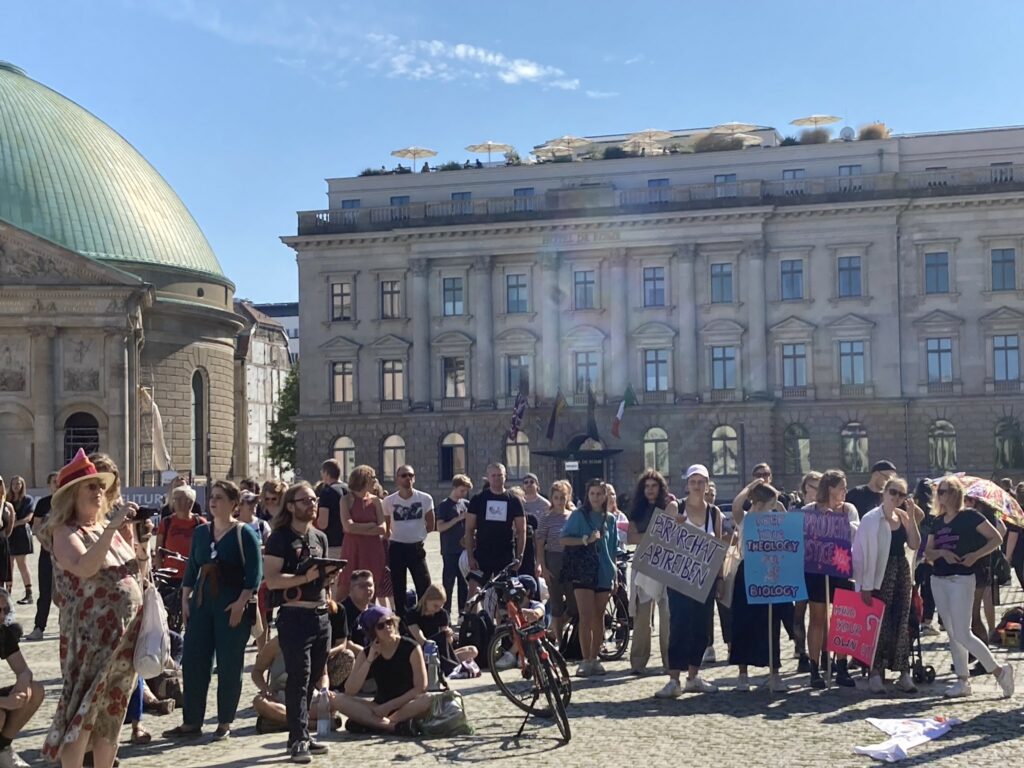
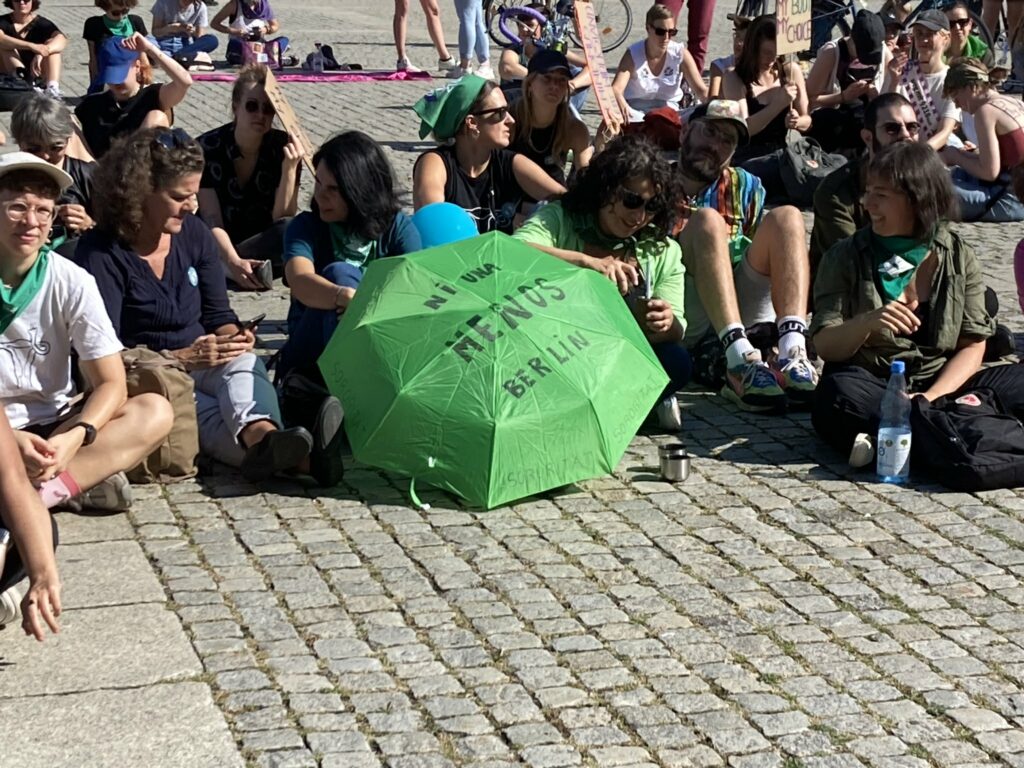
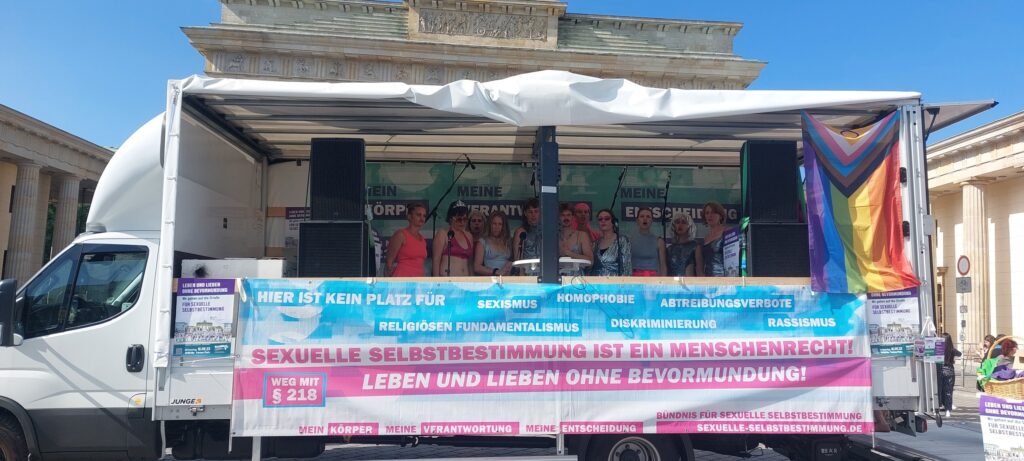
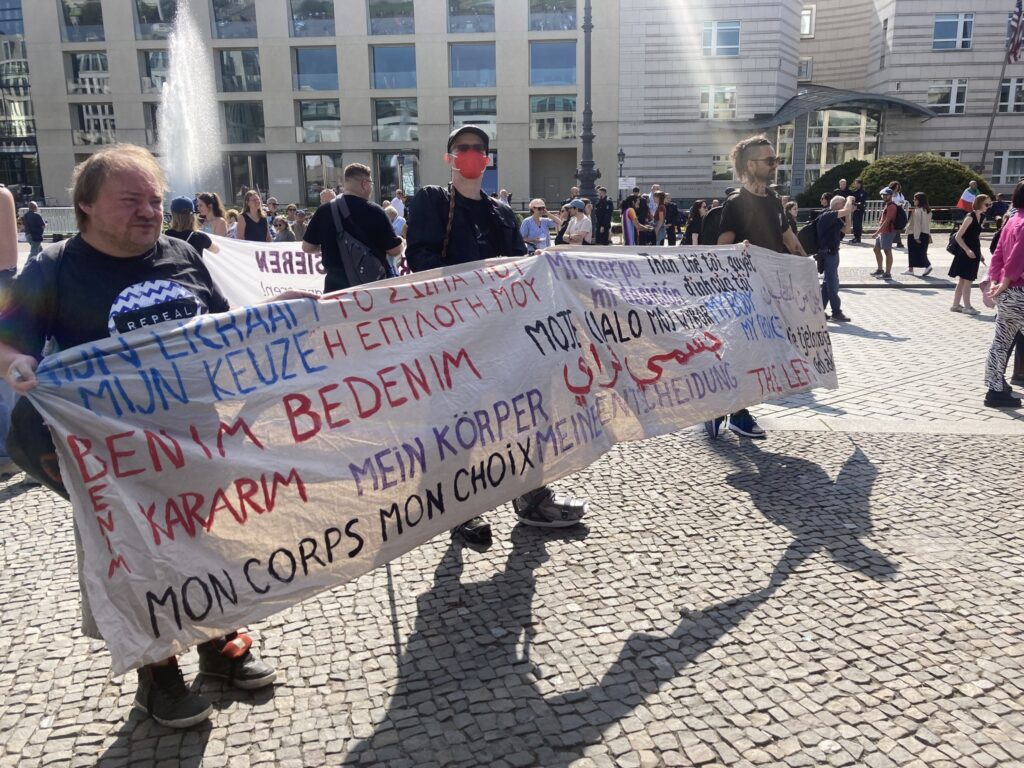
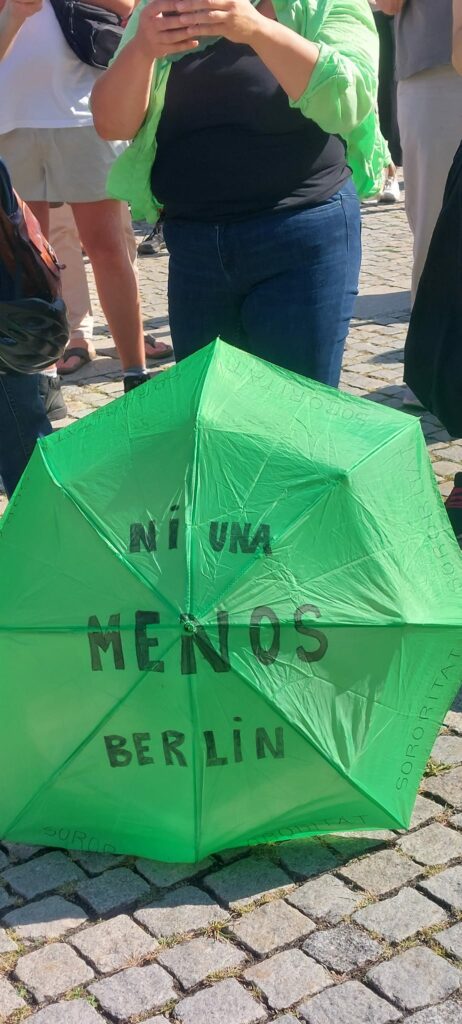
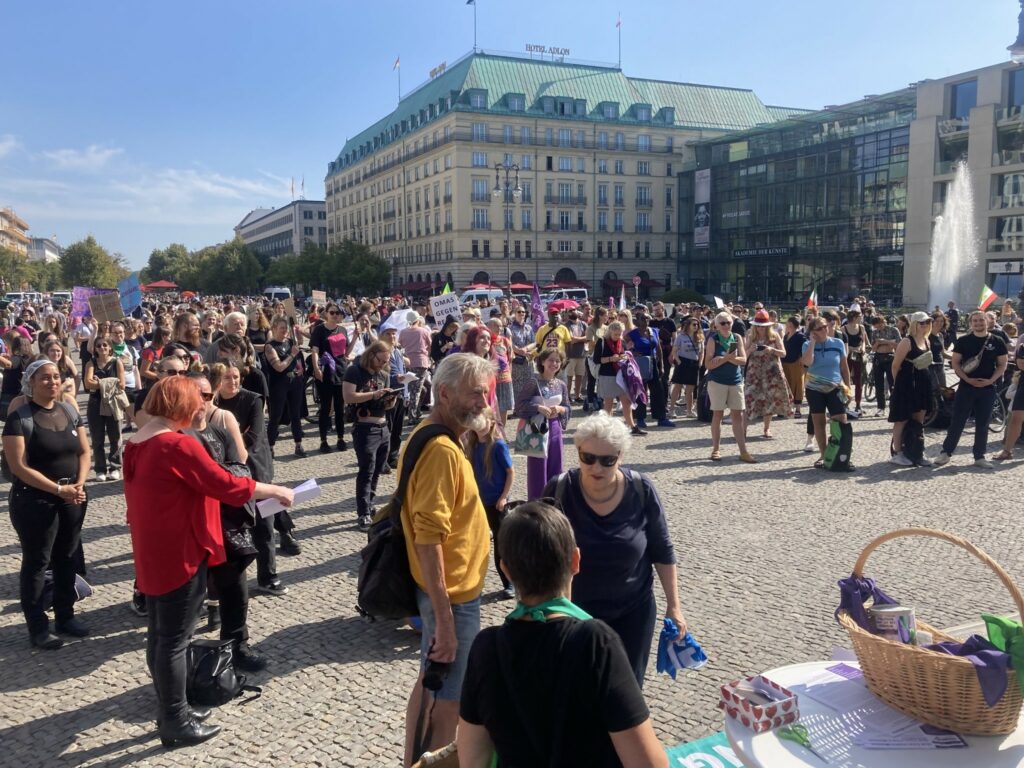
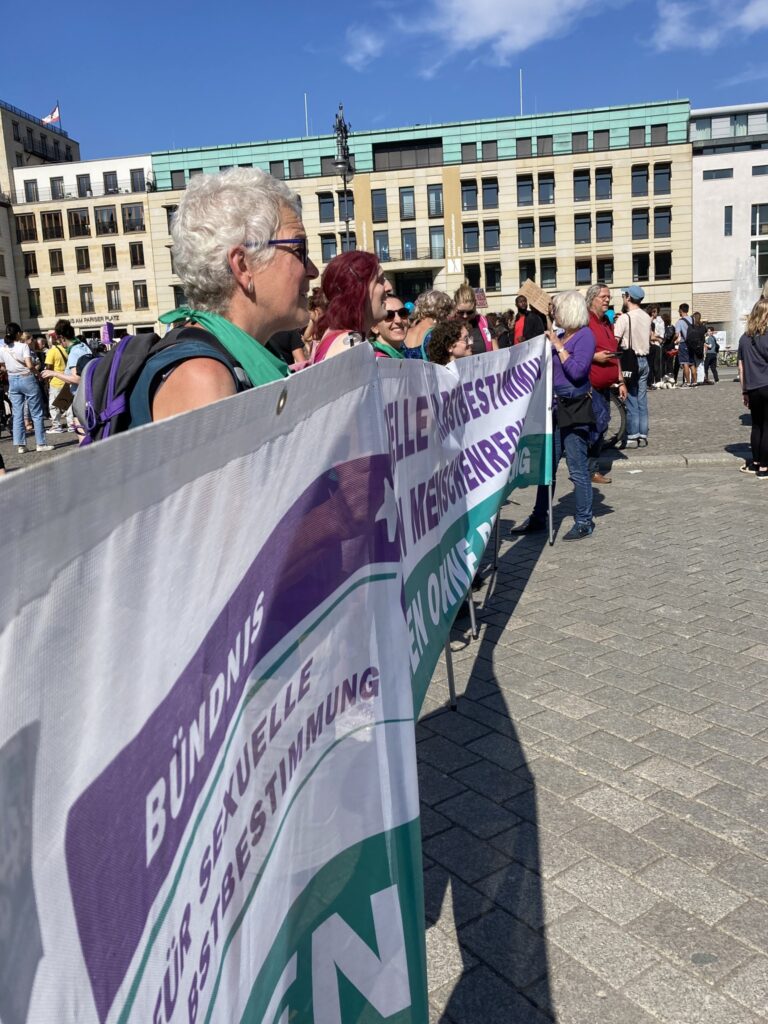
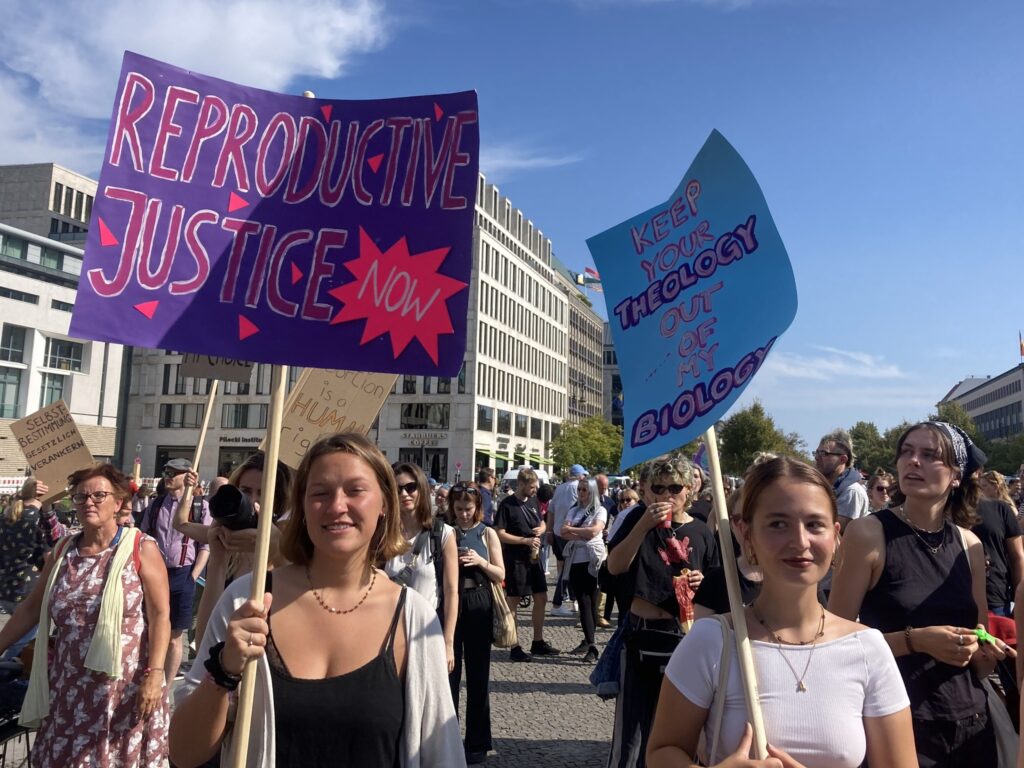
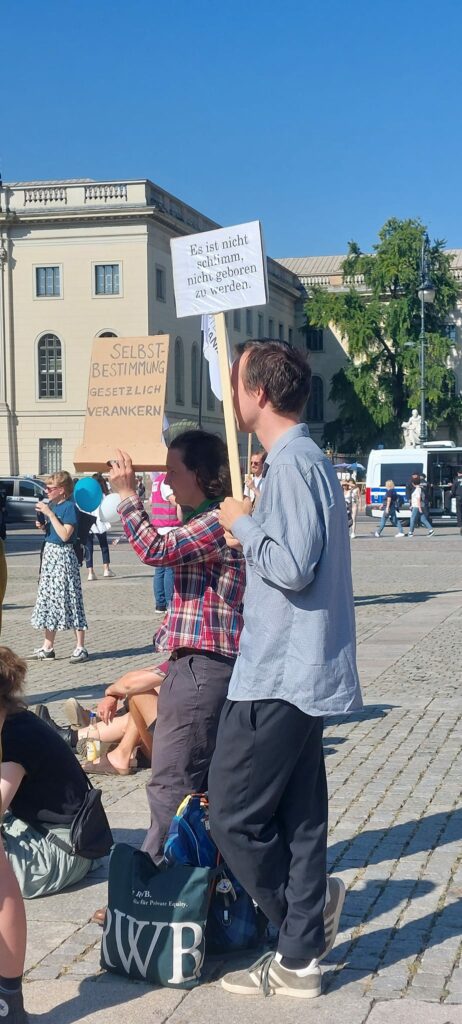
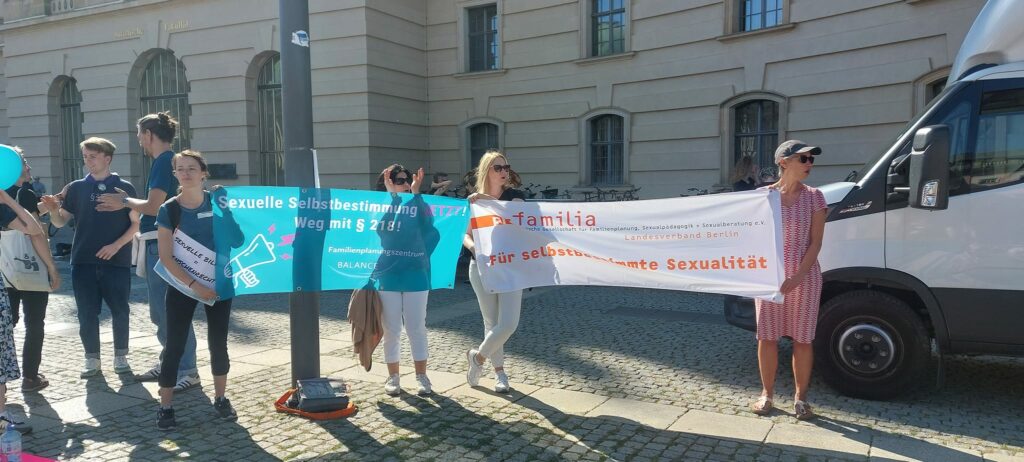
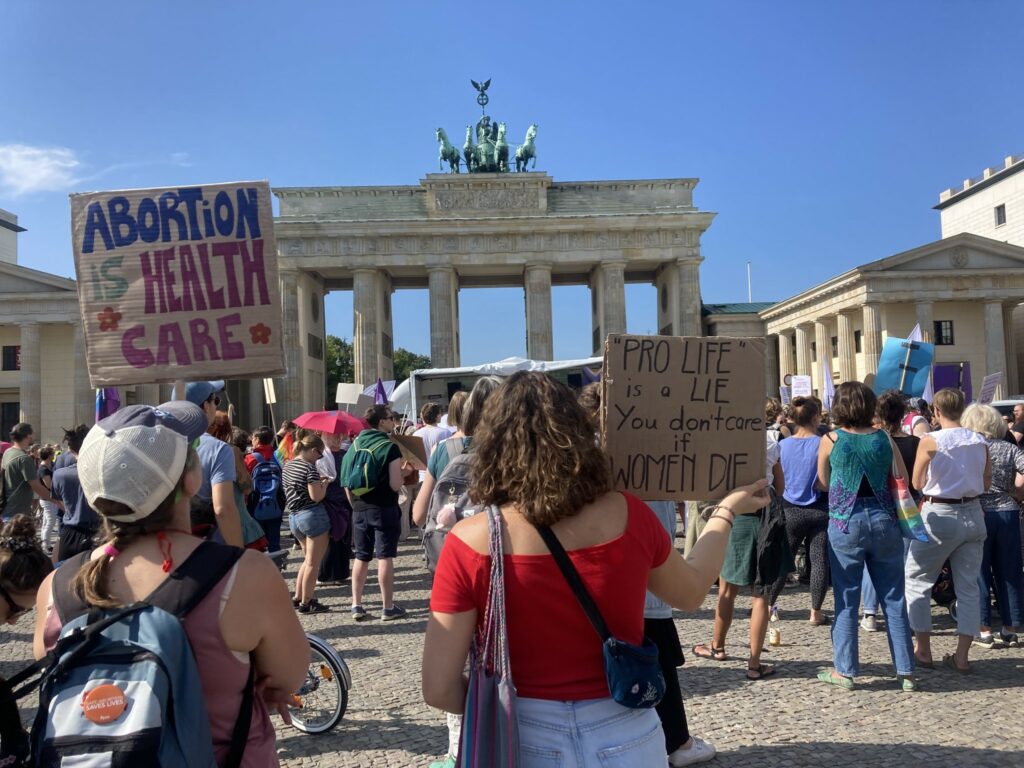
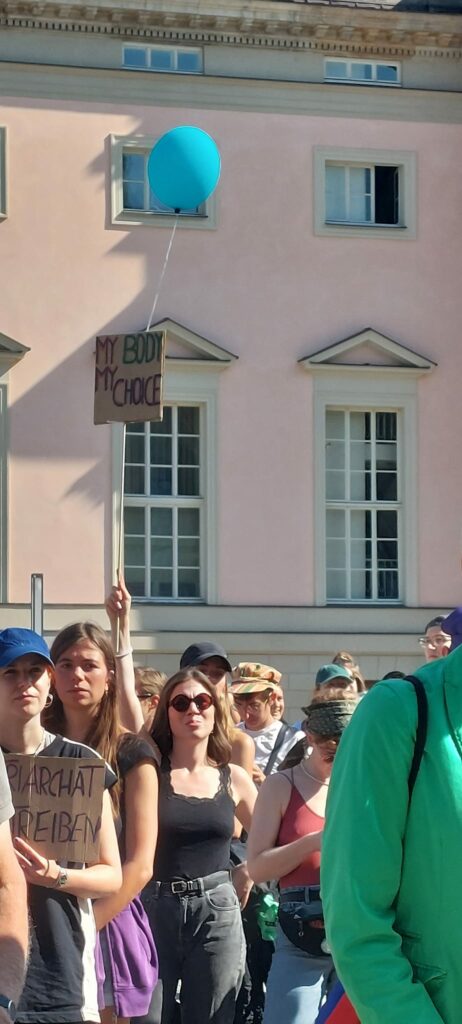
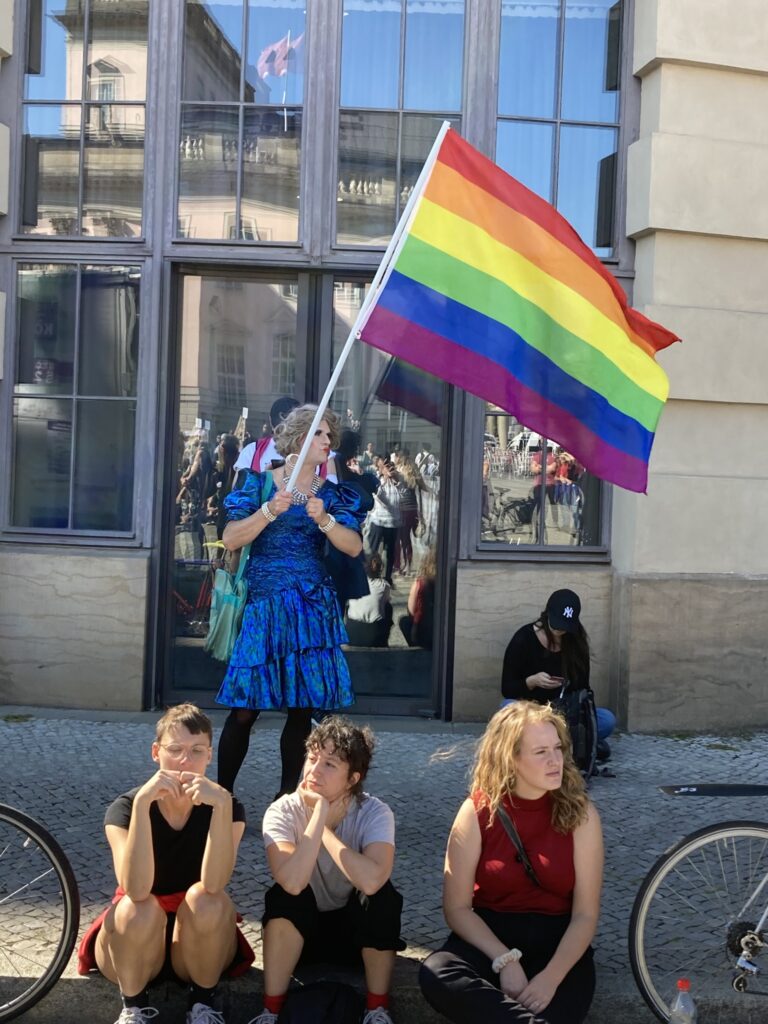
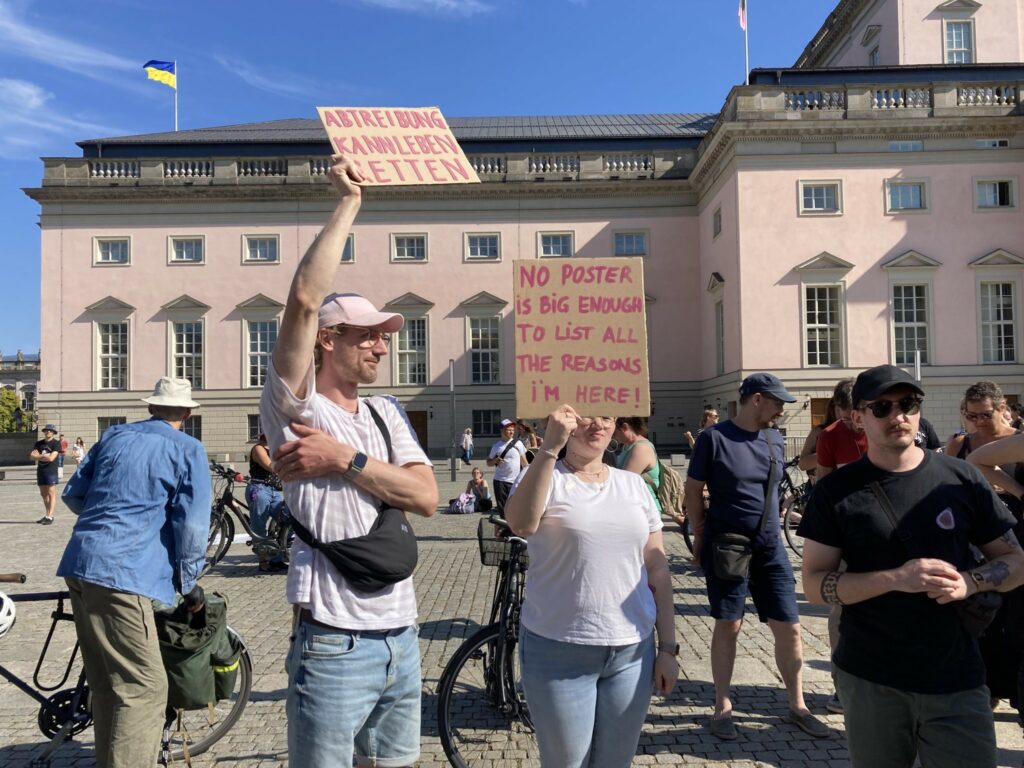
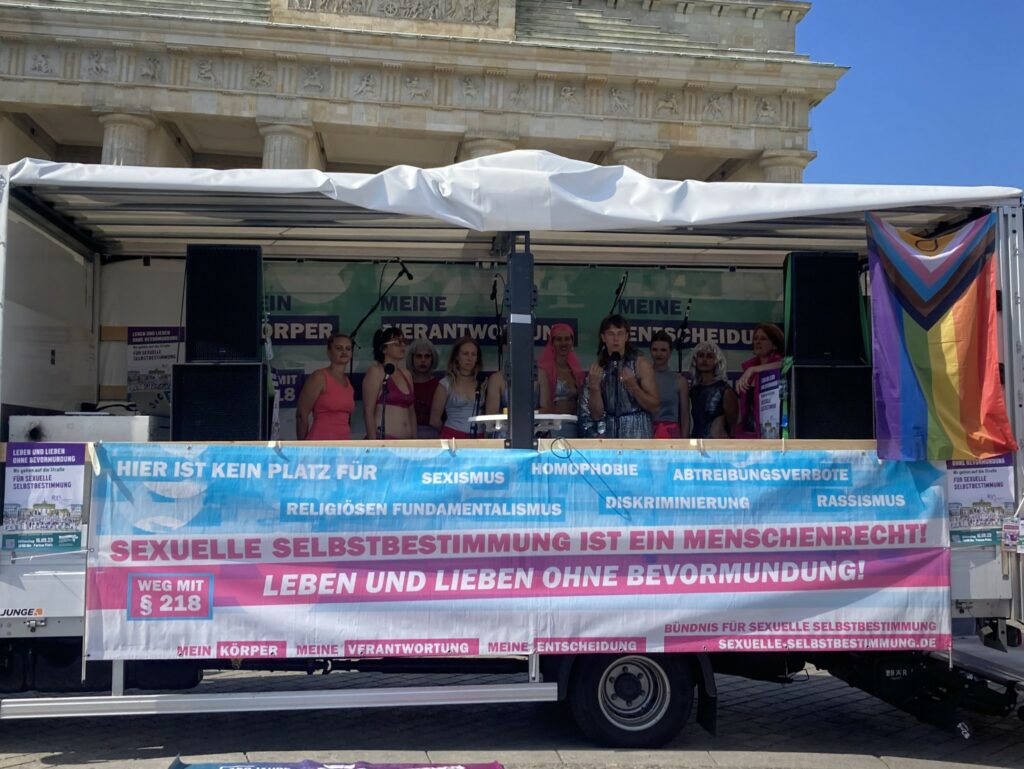
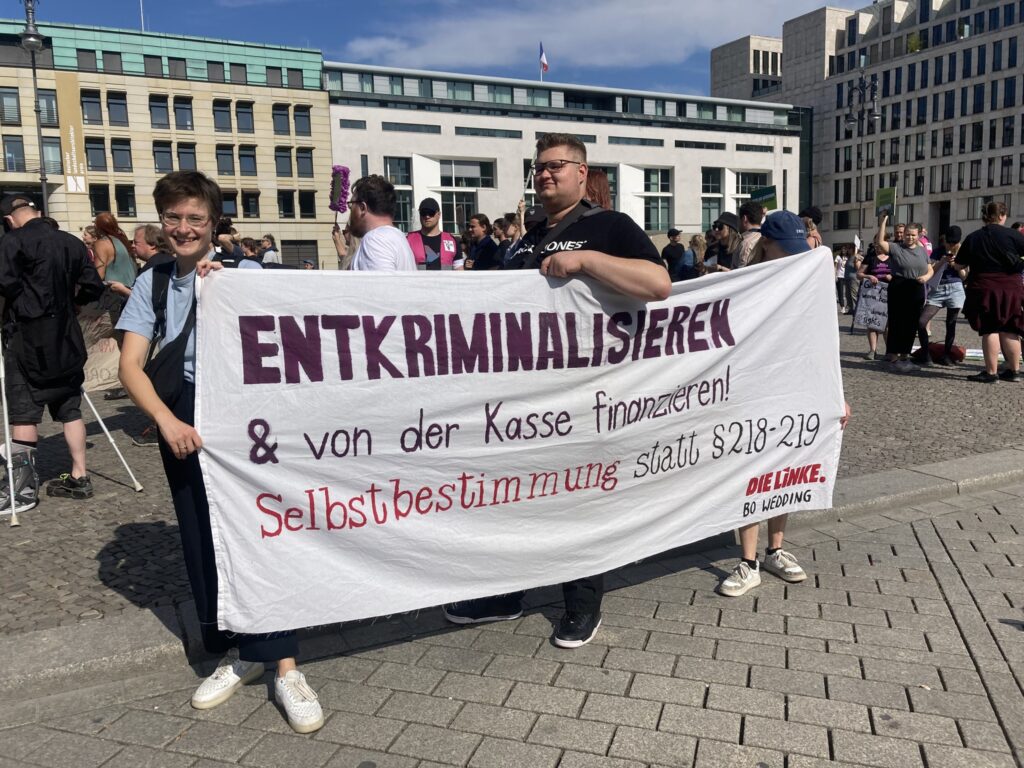
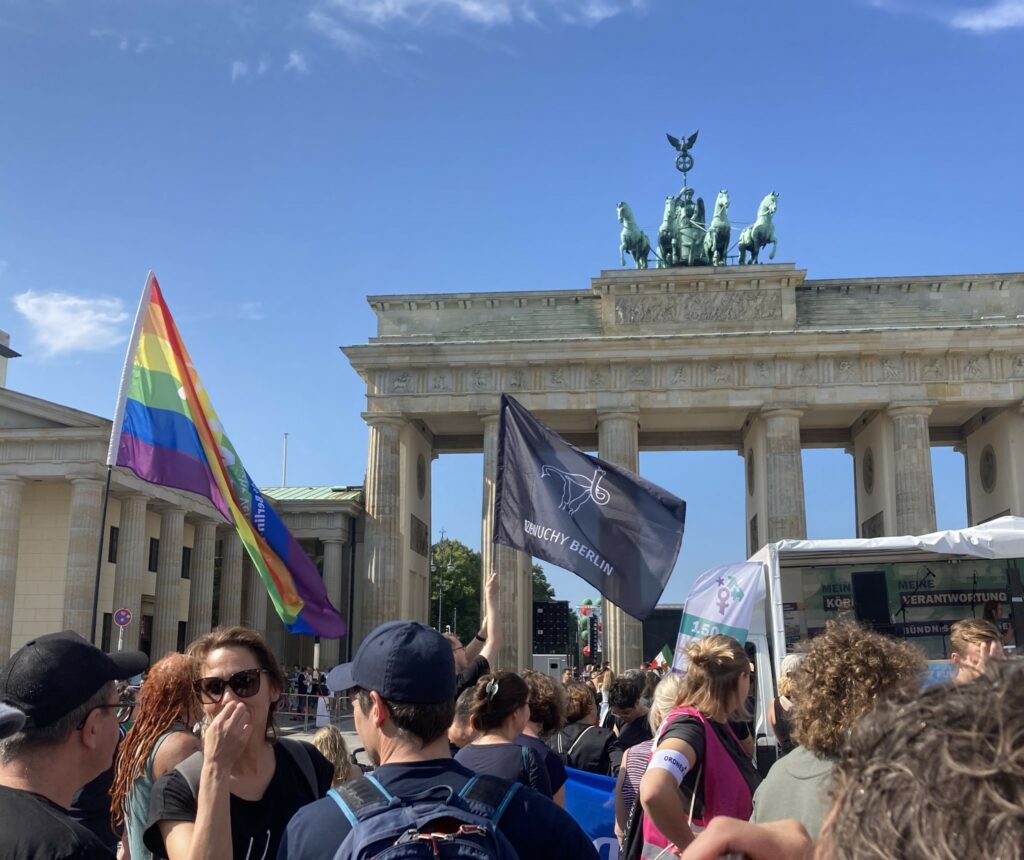
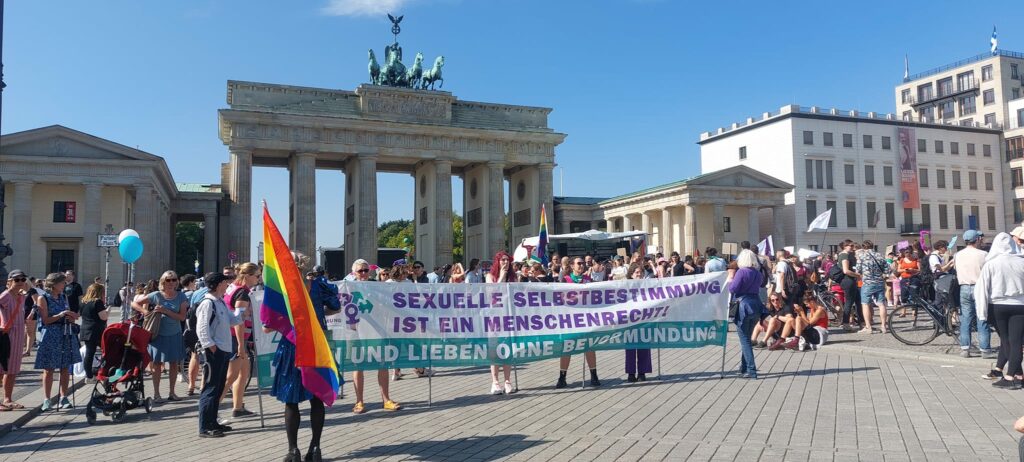
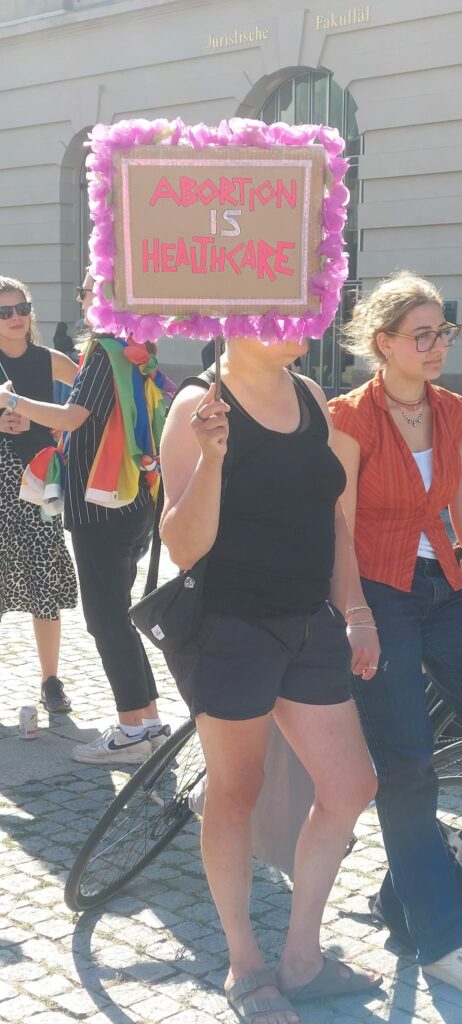
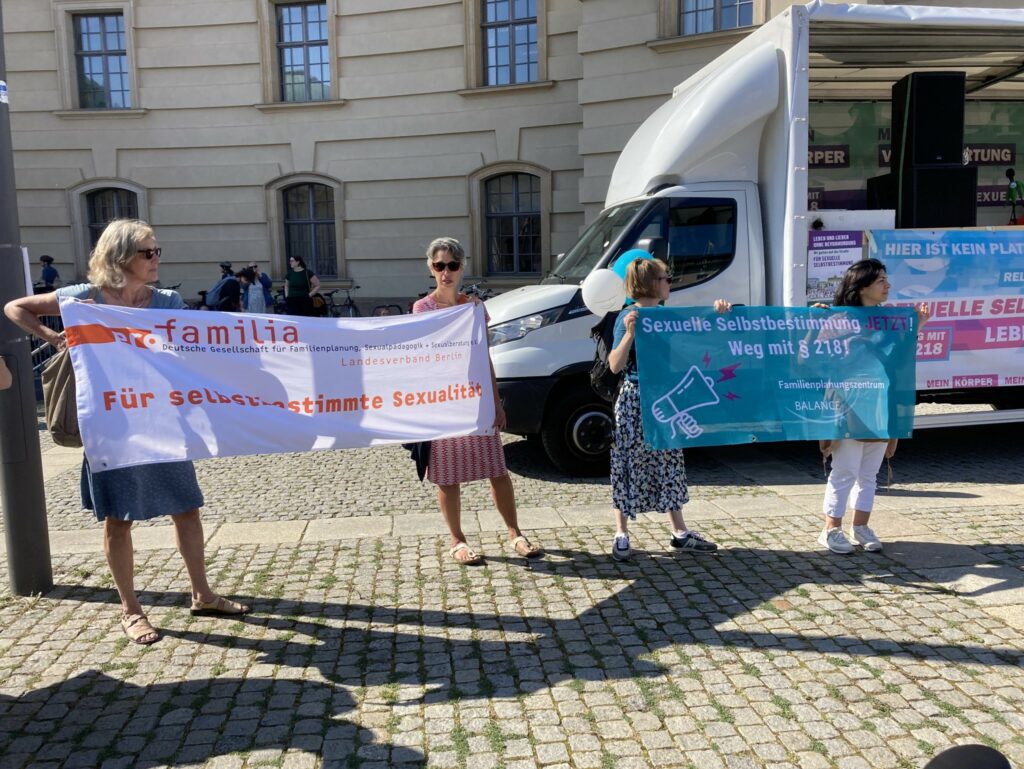
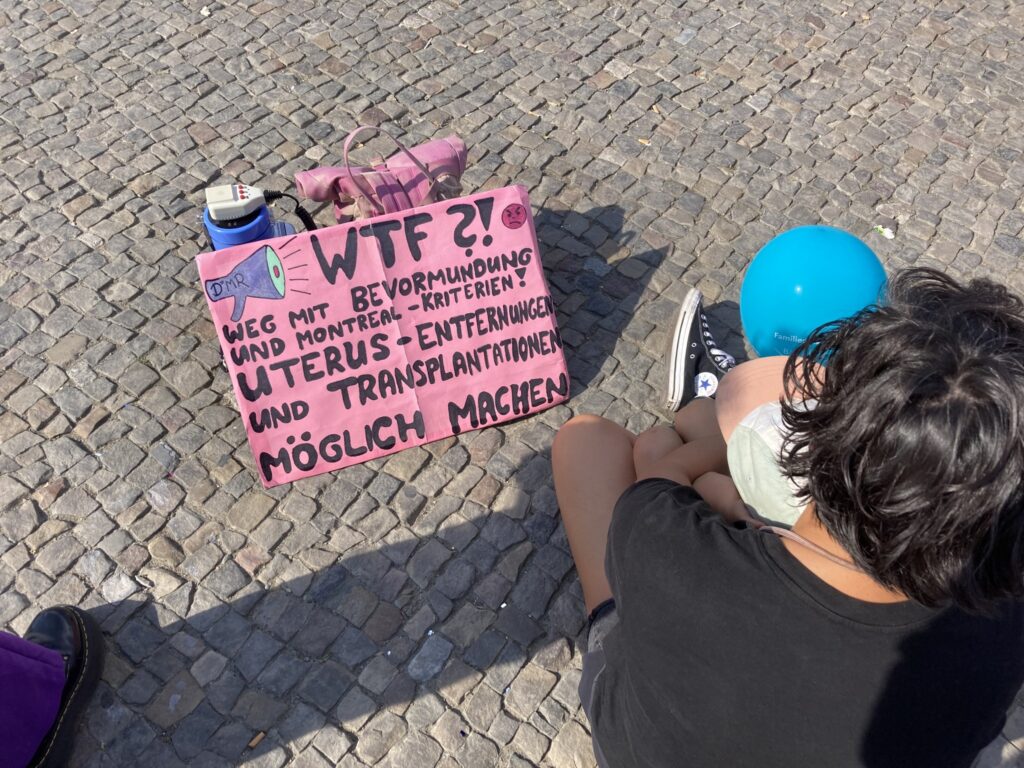
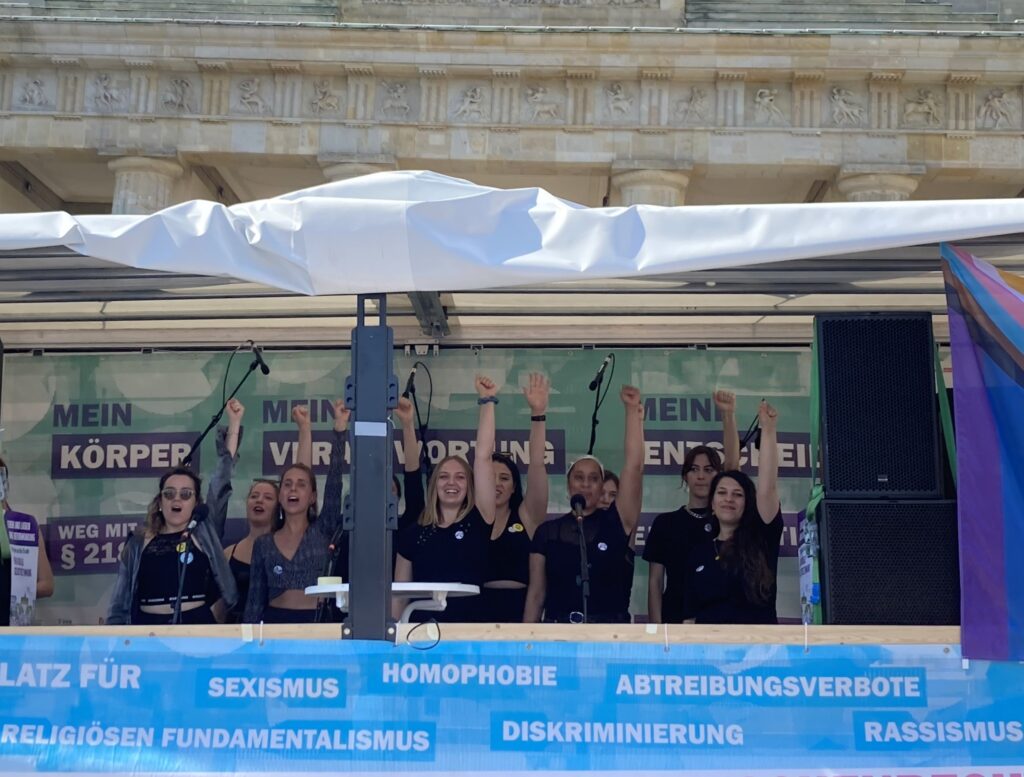
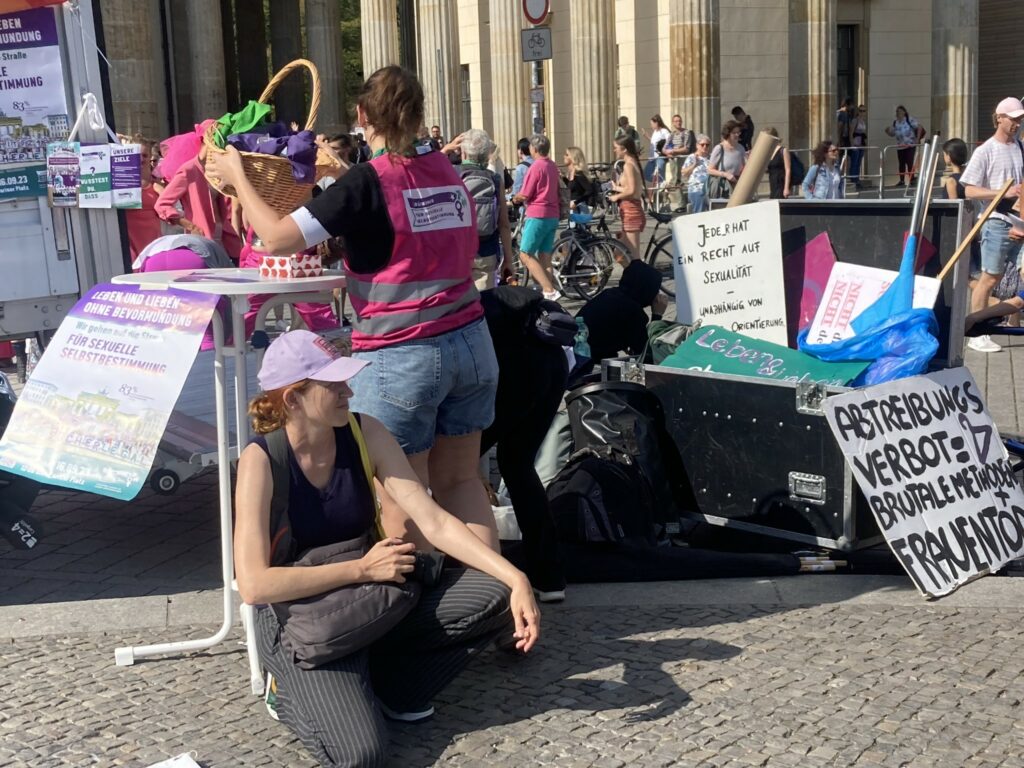
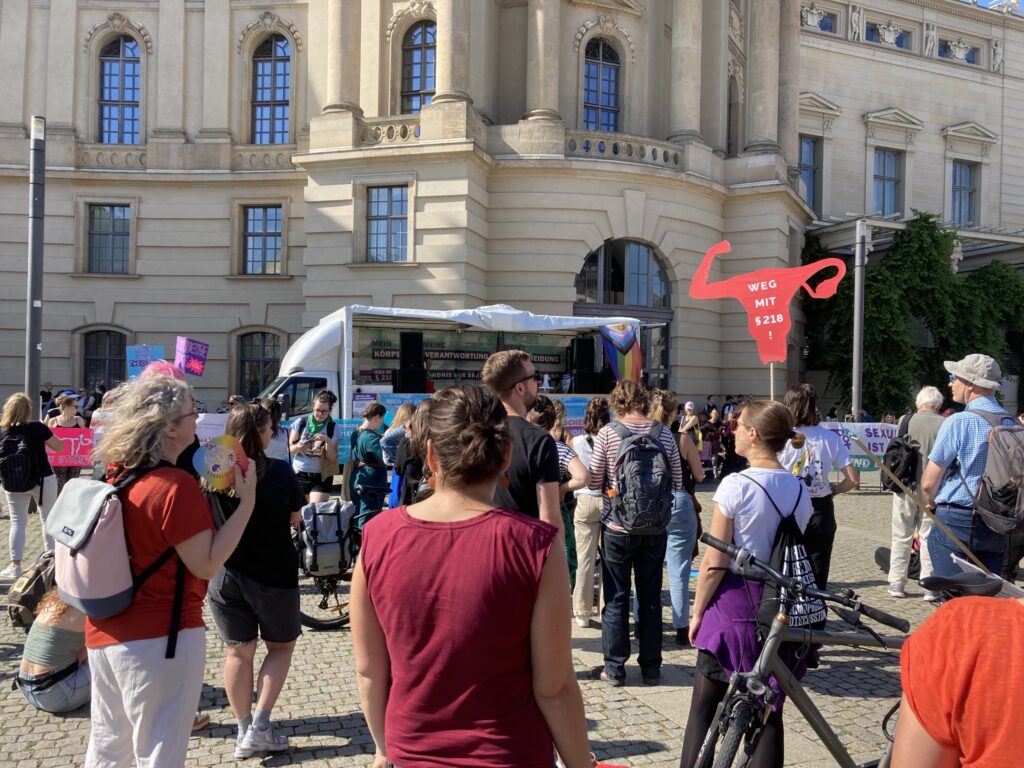
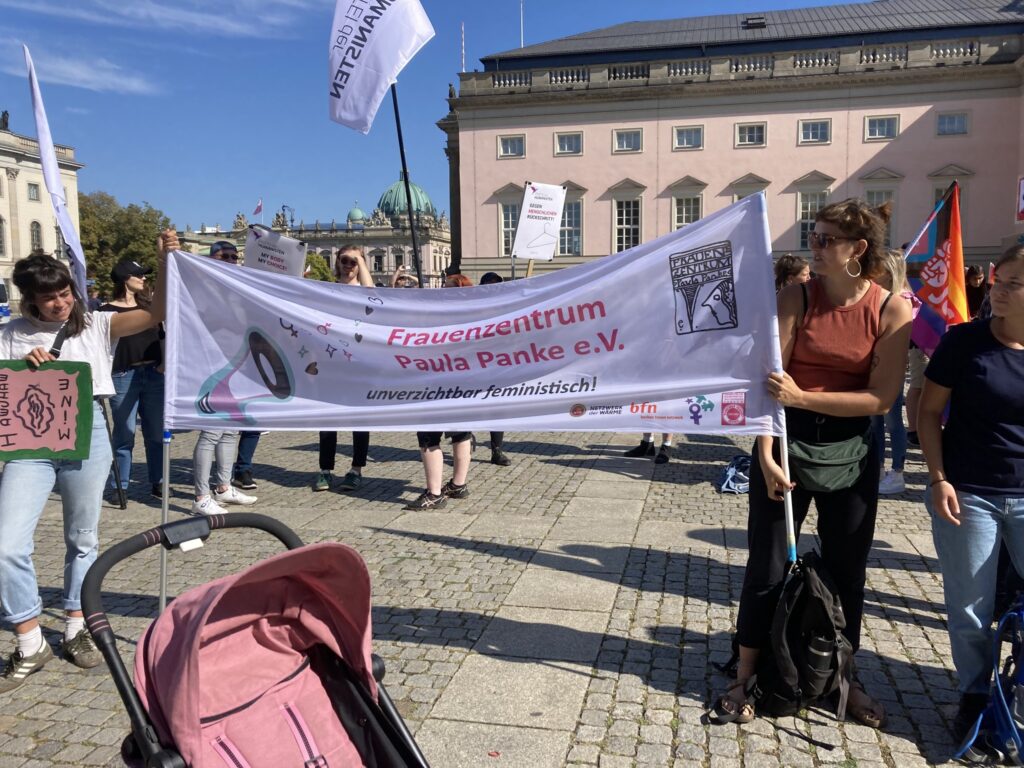
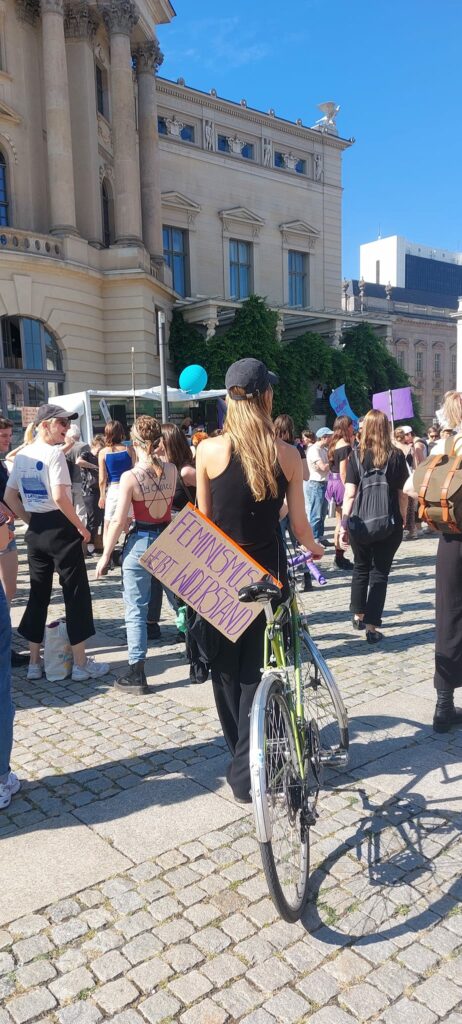
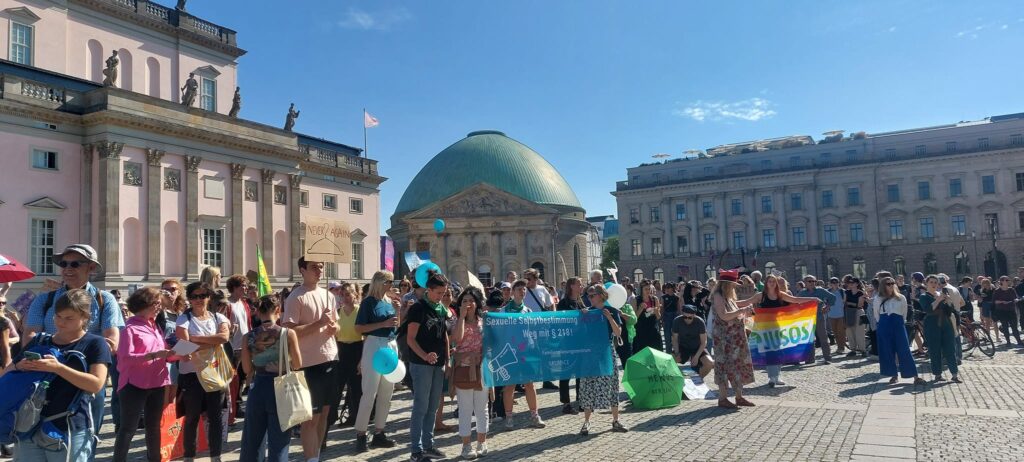
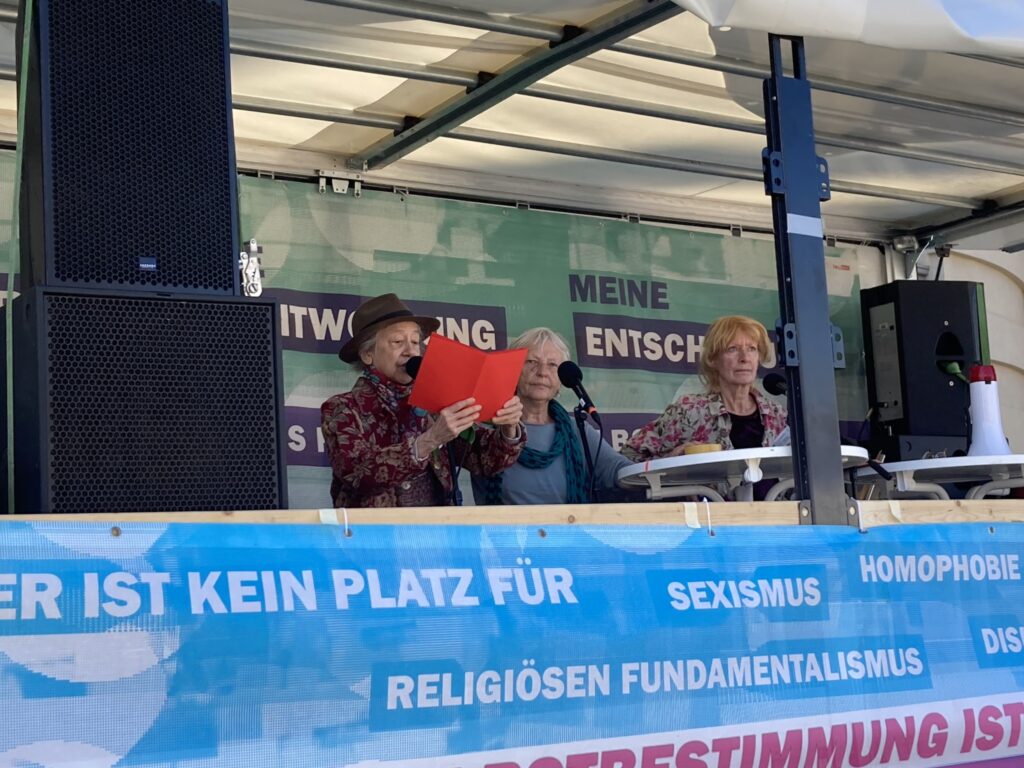
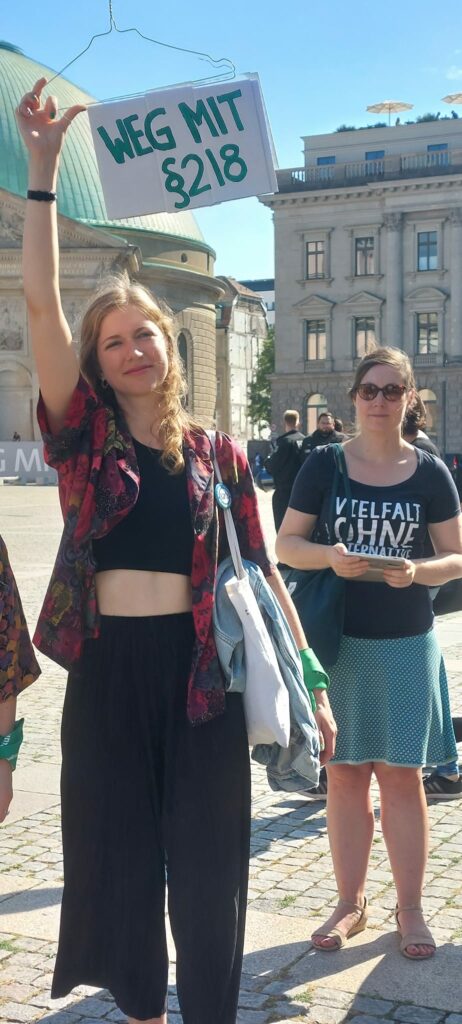
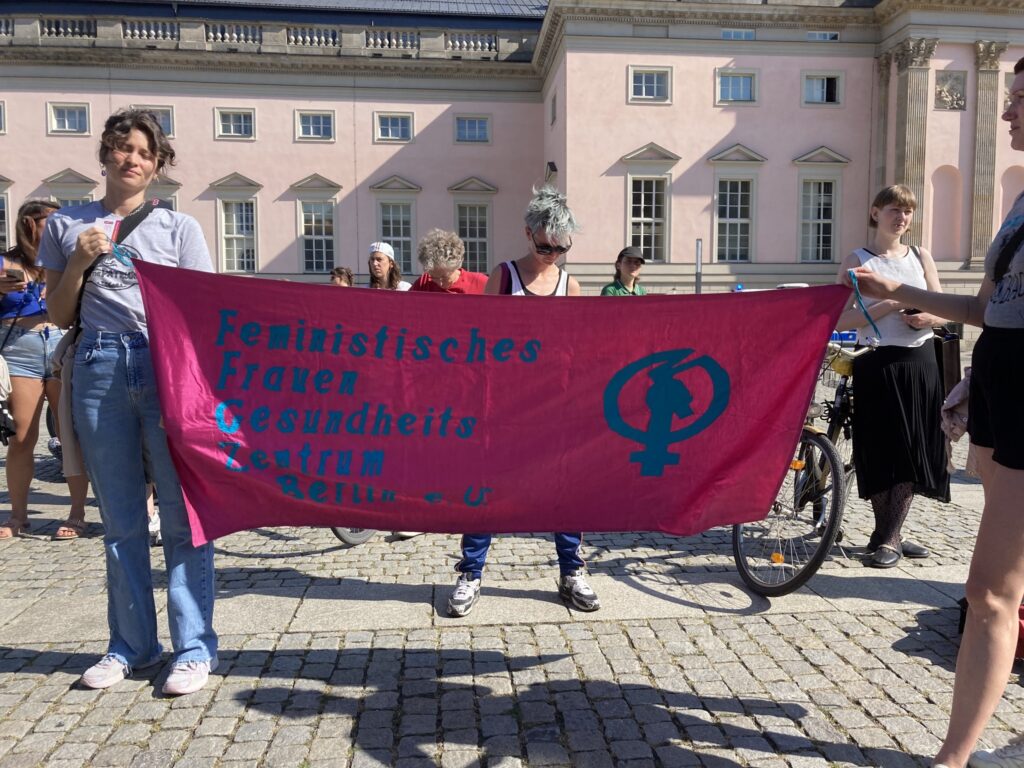
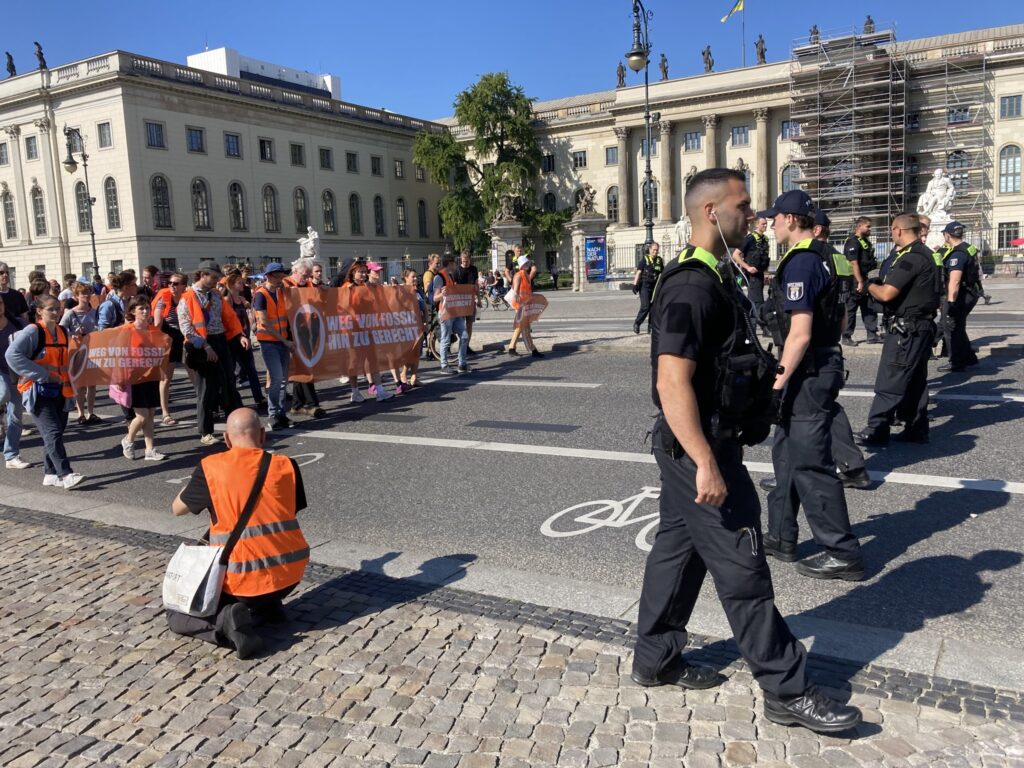
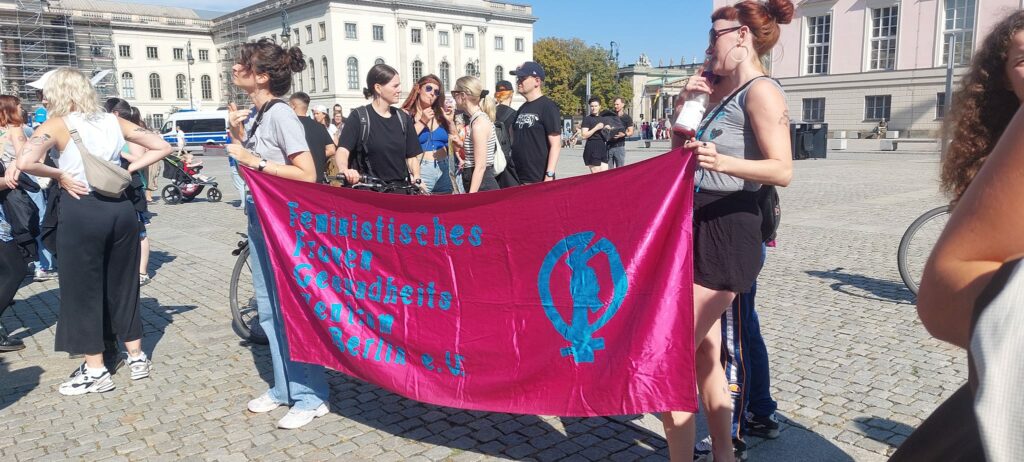
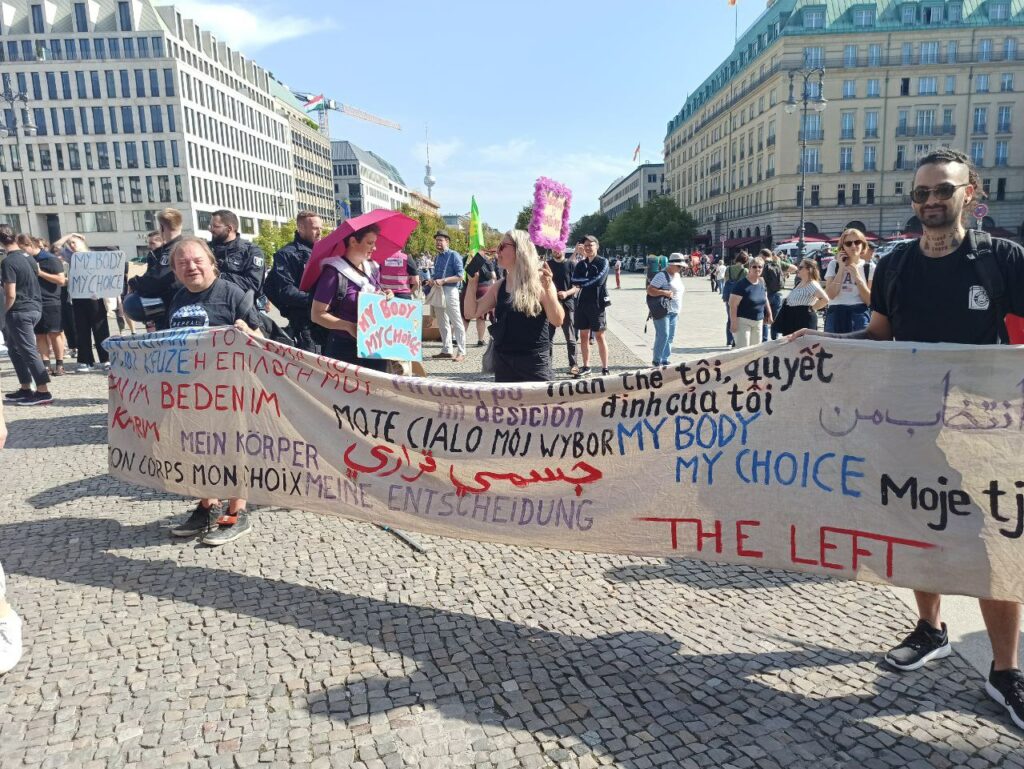
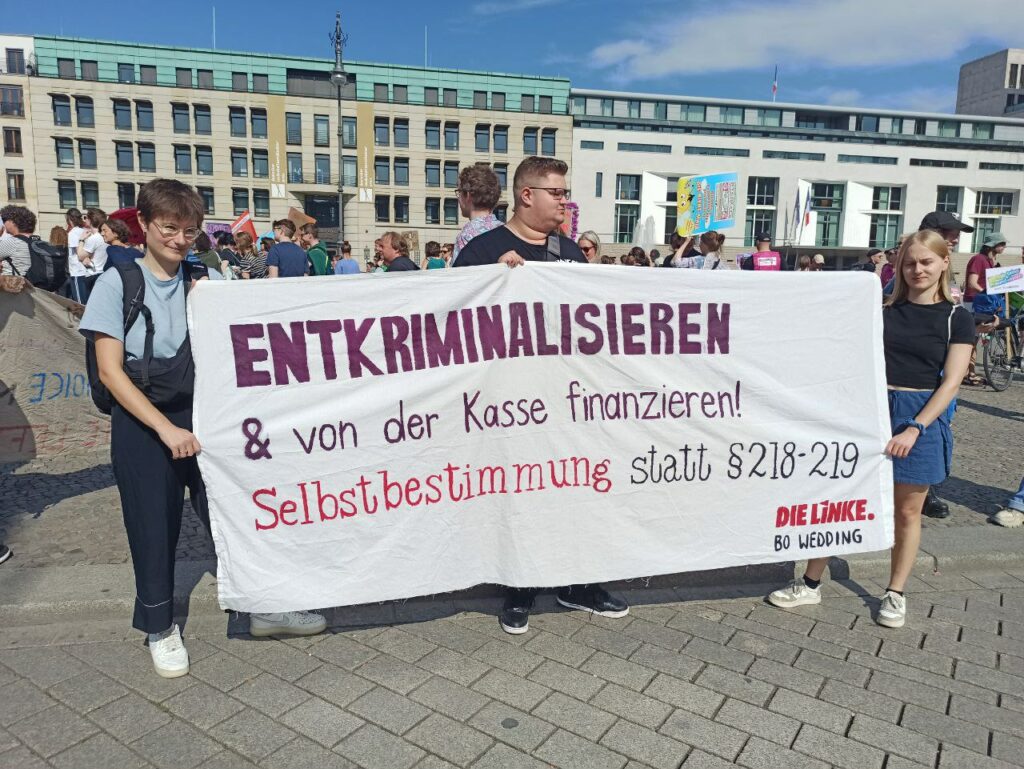
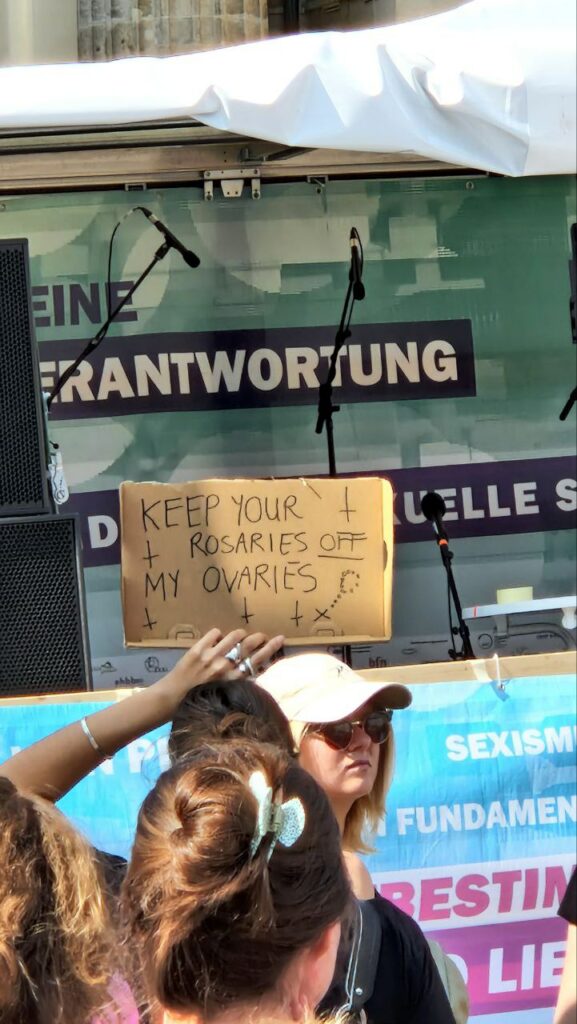
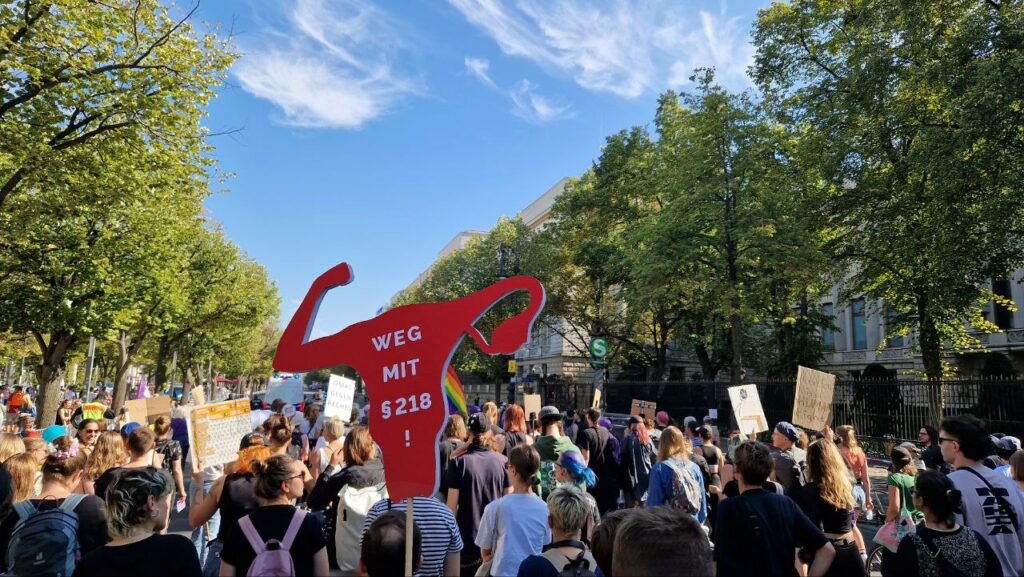
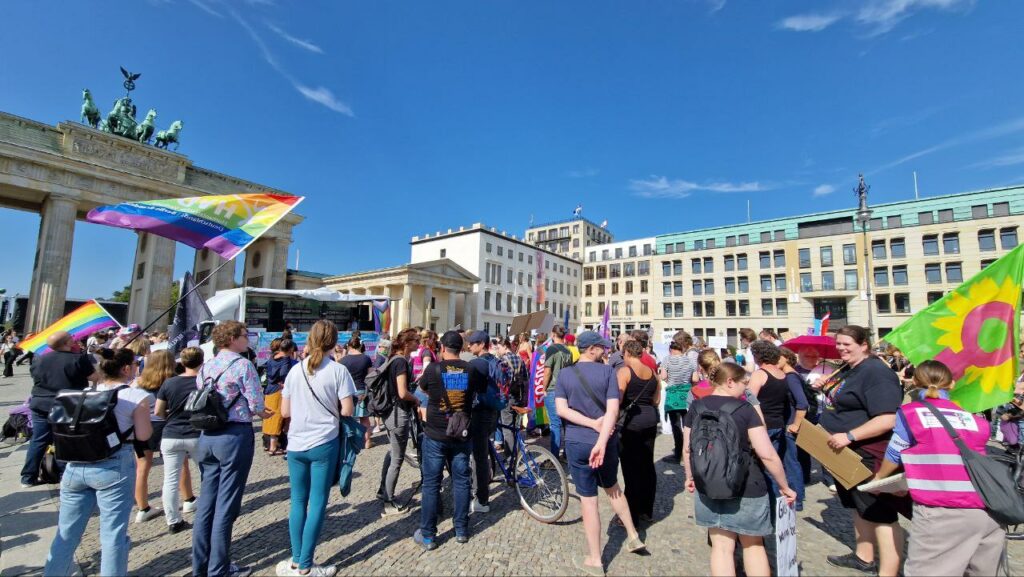
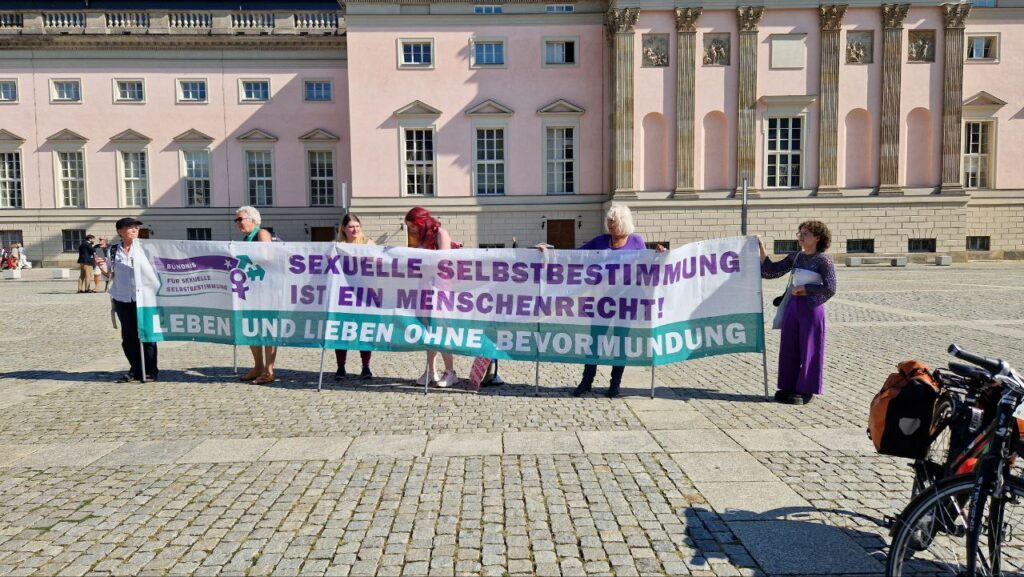
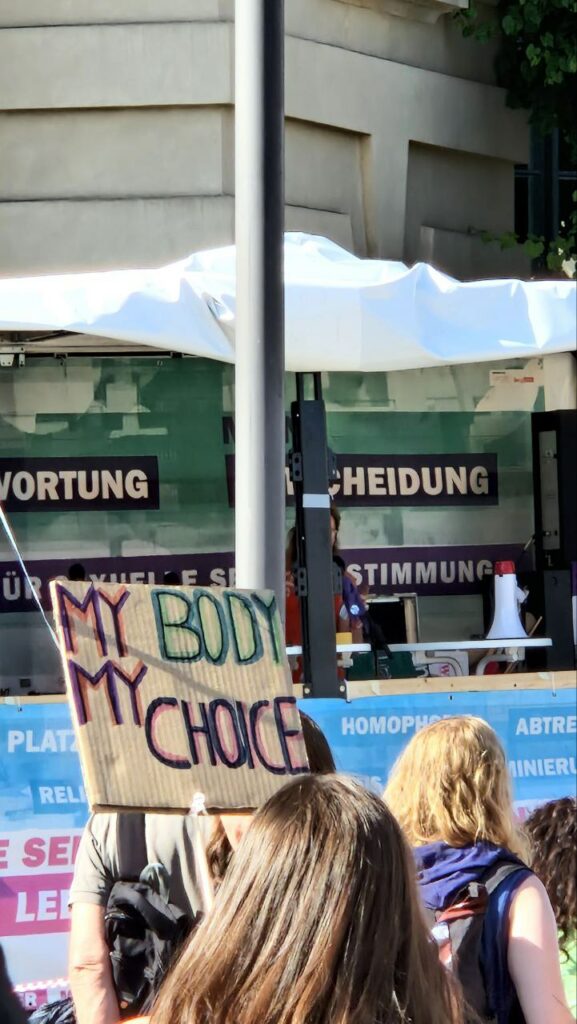
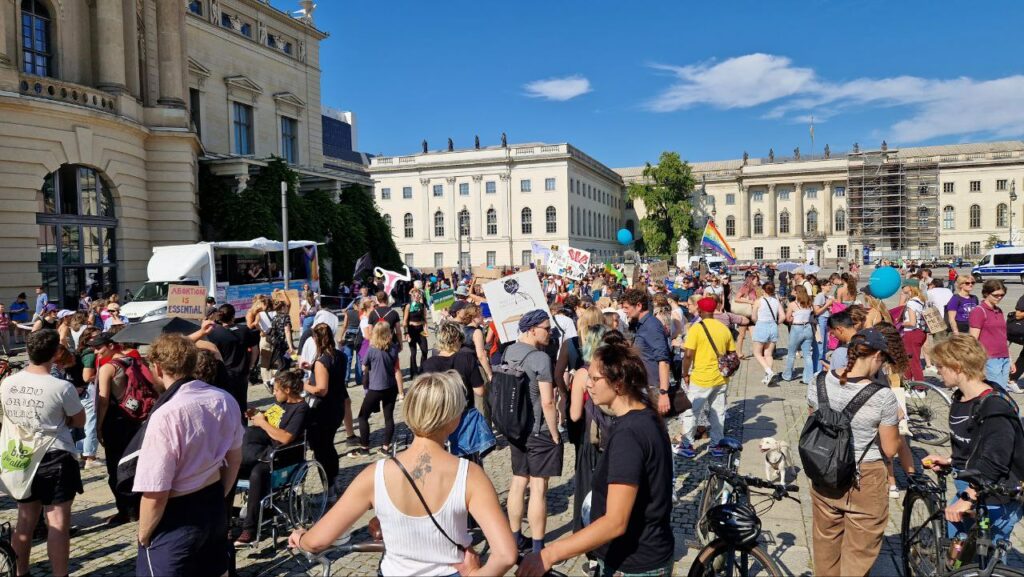
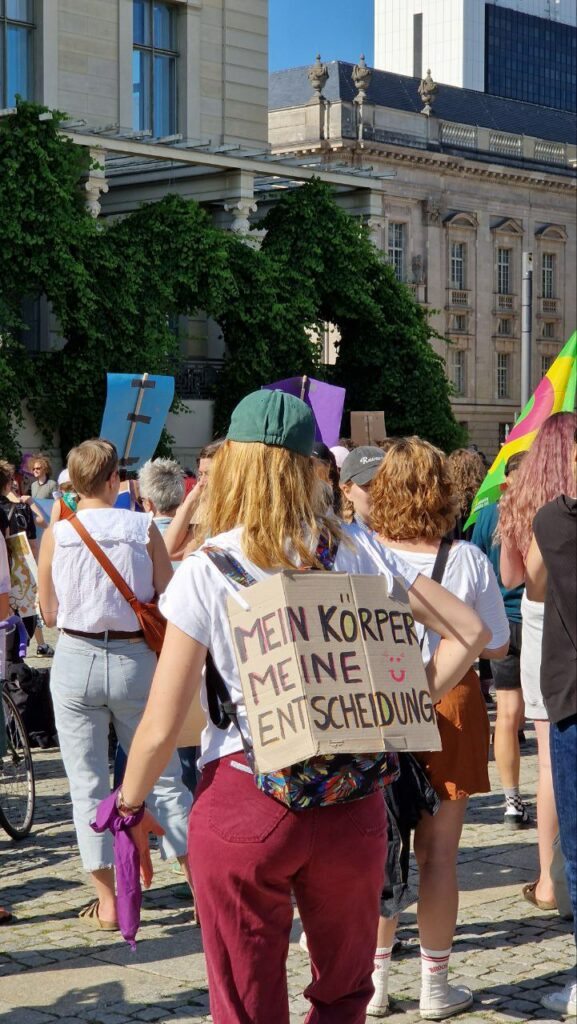
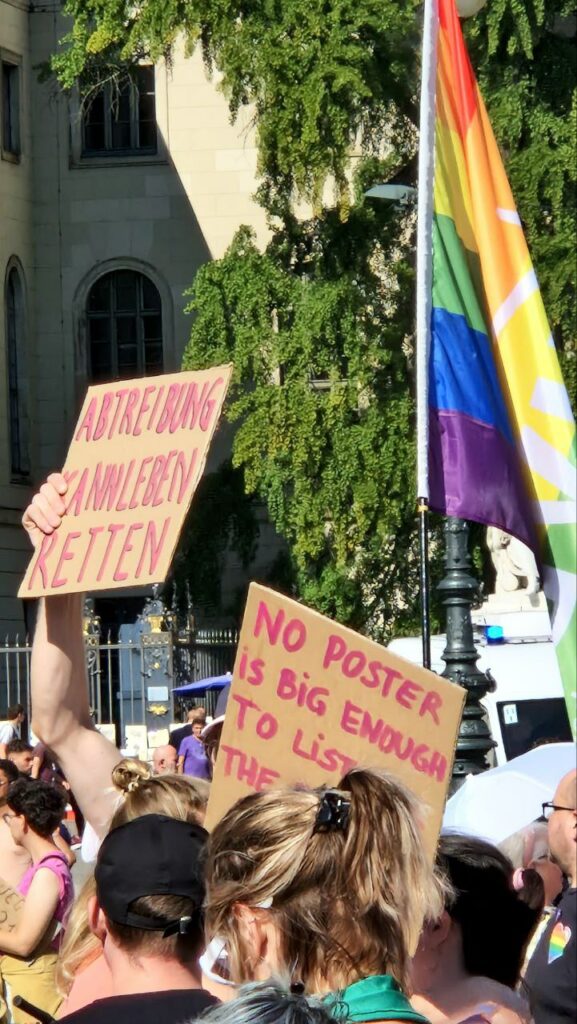
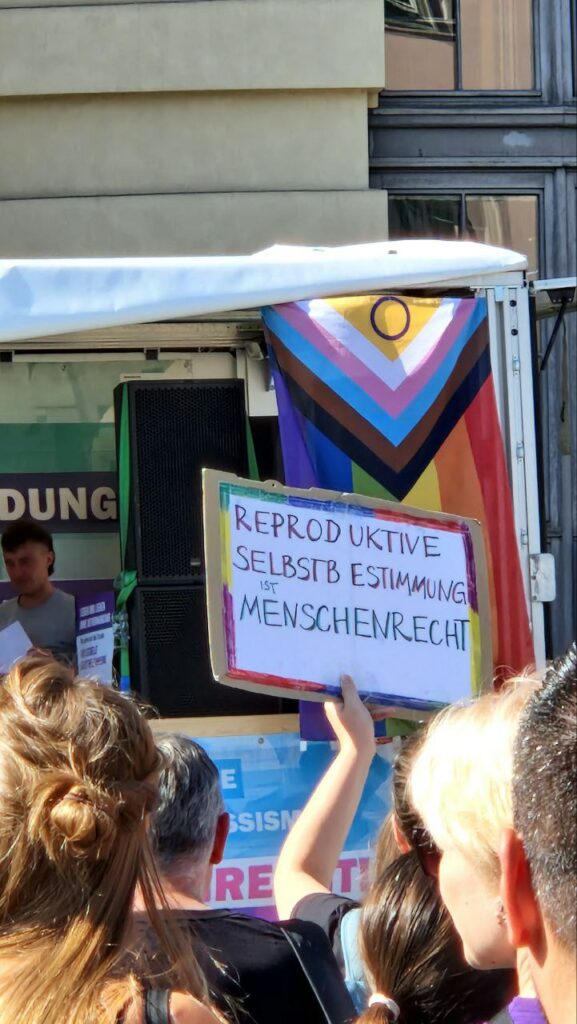
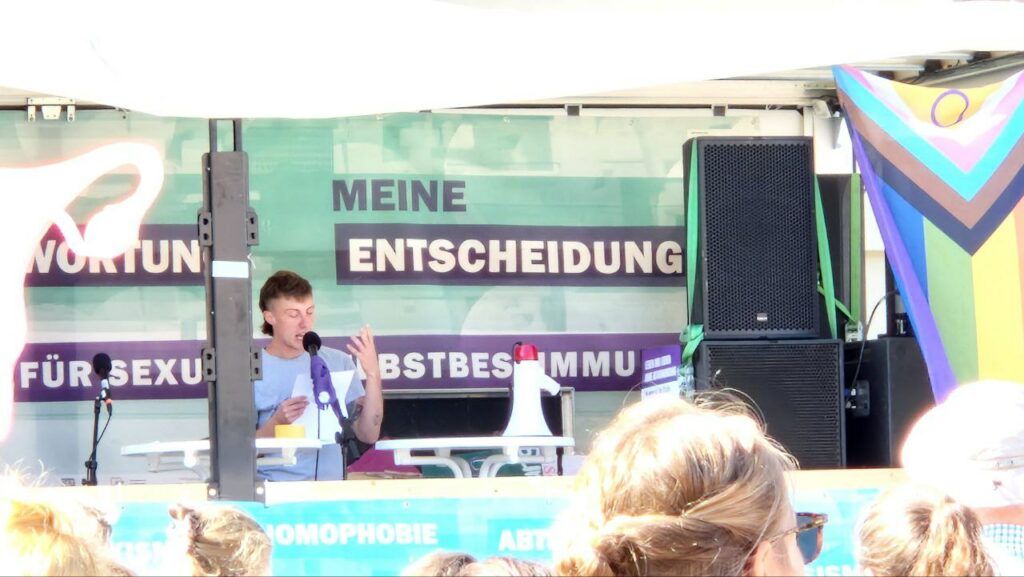
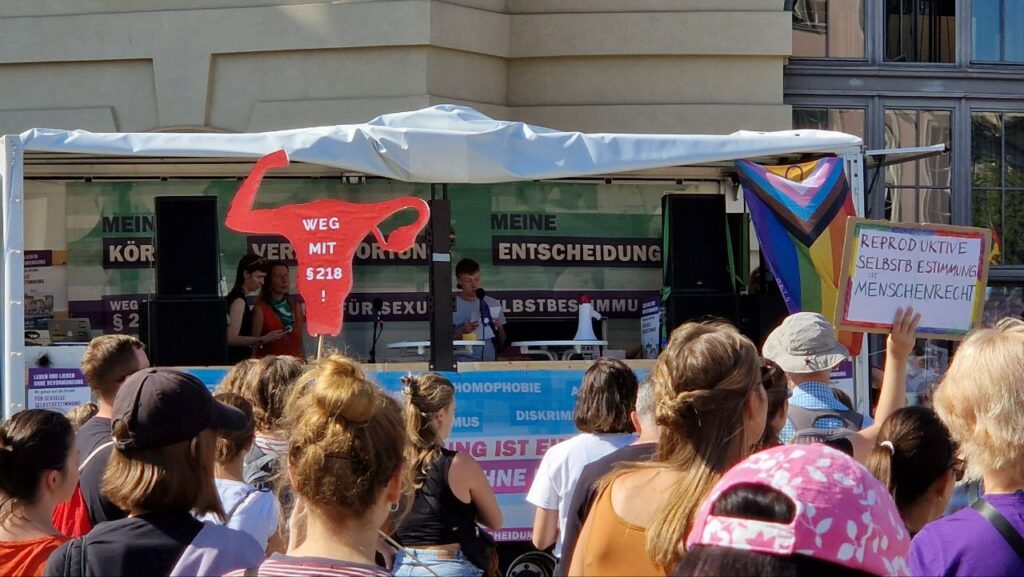
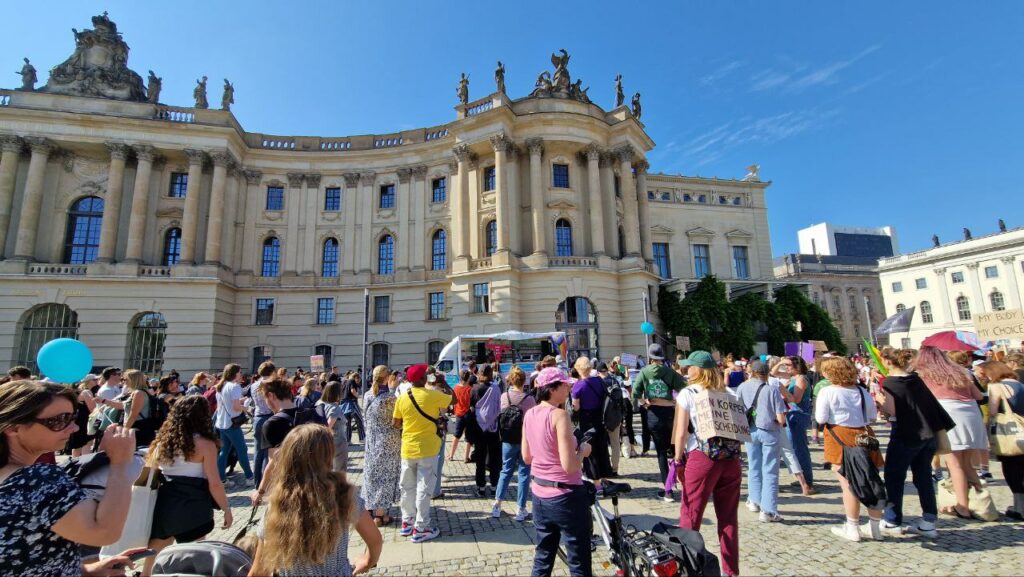
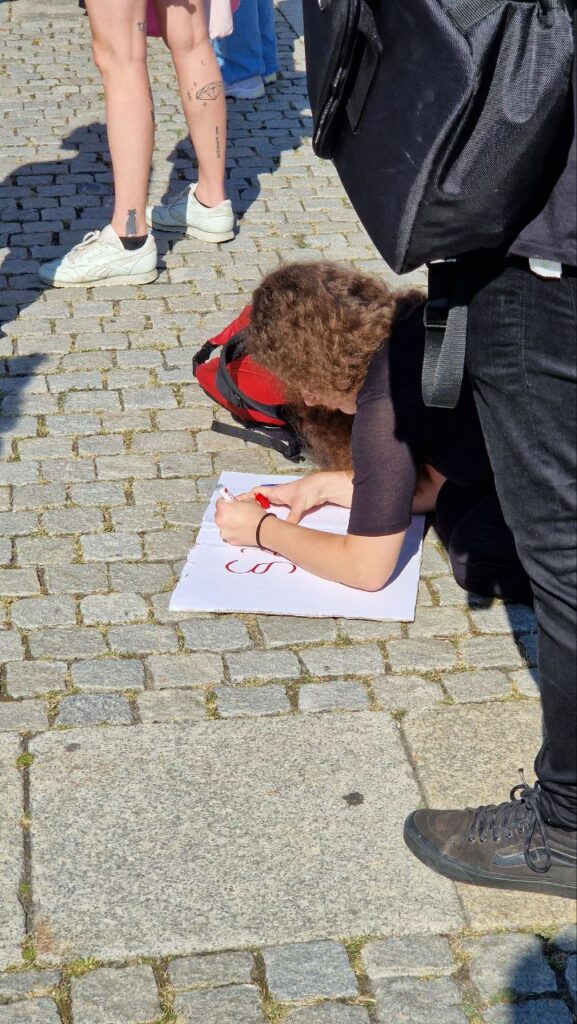
Photos: Phil Butland, Antony Hamilton, Brian Janßen, Rosemarie Nünning
Demonstration from Brandenburger Tor to Bebelplatz organised by the Bündnis für Sexuelle Selbstbestimmung
The Left Berlin
16/09/2023
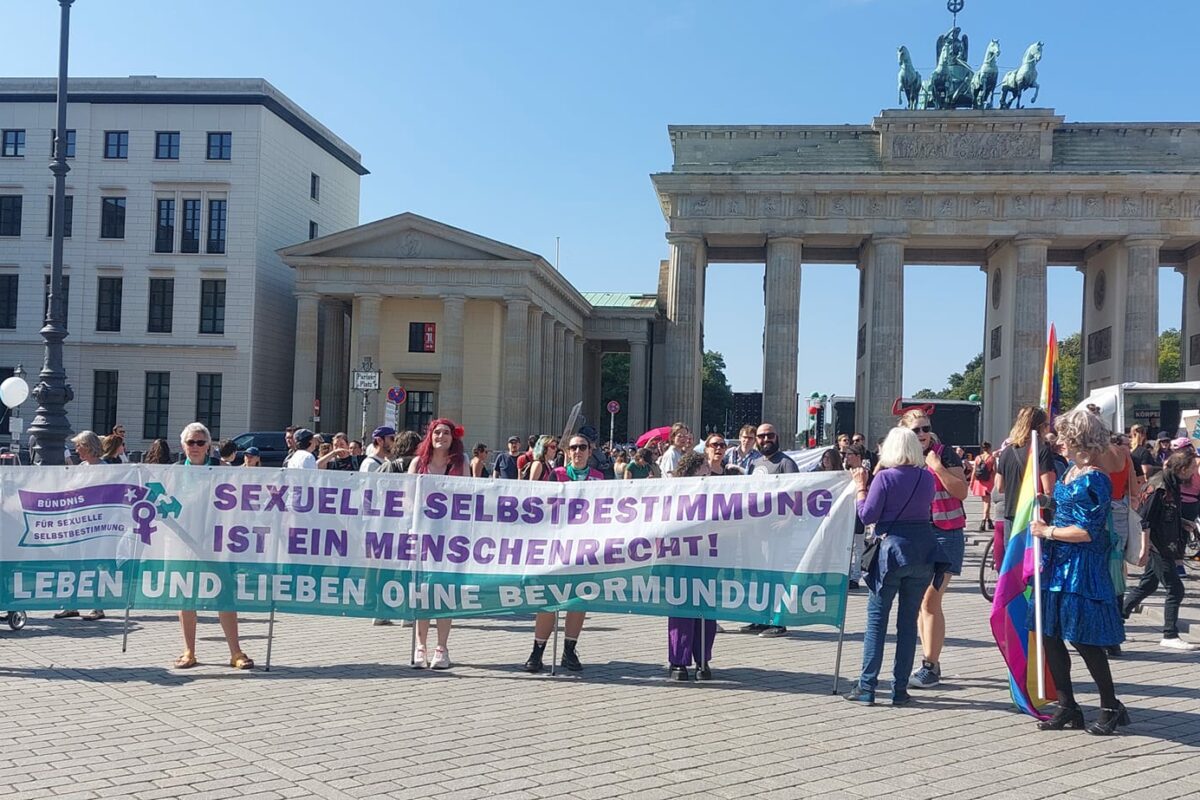
















































Photos: Phil Butland, Antony Hamilton, Brian Janßen, Rosemarie Nünning
Imperial powers are profiting from Azerbaijan’s offensive against Armenia
Jerome Chakaryan-Bachelier
15/09/2023
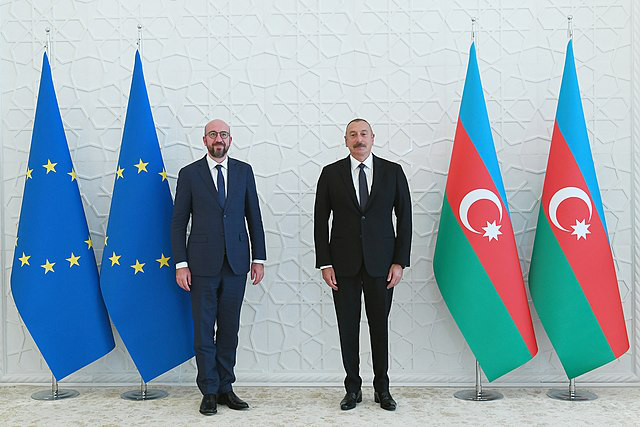
A party which has monopolized power for decades, a muzzled press, an army that regularly violates international law and commits war crimes, and a mafia clan that holds on to power thanks to its gas exports… You might think we’re talking about Vladimir Putin’s Russia, but we’re actually talking about Ilham Aliyev’s Azerbaijan. Far from being considered a rogue state by the European Union, the latter has steadily drawn closer to Azerbaijan since the start of the war in Ukraine. Ursula von der Leyen described Ilham Aliyev as a “reliable and dependable partner” at a press conference in July 2022, only shortly after the Azeri regime re-started its campaign of brutal military aggression against its Armenian neighbor. Could the European Union once again offer up Armenia as a sacrifice to the appetites of Azerbaijan?
The 44-day war between Armenia and Azerbaijan in 2020 did not draw special attention from Western journalists. Yet the intensity, brutality, and innovative military strategies of this invasion were anything but commonplace in the Caucasus region. The total war waged by the Aliyev clan’s regime took up old practices such as the bombing of civilian targets, extreme anti-Armenian hate campaigns, execution of prisoners, torture of civilians, and psychological warfare aimed at paralyzing the opposing side, among other tactics.
The conflict also took on the hallmarks of the 21st century. The use of drones became a central element of Azeri tactics, due to their noise – which sows panic among civilians and soldiers alike – and the difficulty in tracing them. Images of the torturing of civilians and prisoners were shared on Azeri Telegram feeds, showing soldiers laughing. At the same time, Azerbaijan’s army chief and president celebrated their victories by listing the capture of villages and towns, one by one, on Aliev’s Twitter account. The psychological effect on Armenians was significant – all in a context where no one contested the Azeri triumph.
Only a month after the war ended in November 2020, Ursula von der Leyen’s administration, through Josep Borrell (High Representative of the European Union for Foreign Affairs and Security Policy), declared that “the EU wishes to conclude an ambitious new comprehensive agreement with Azerbaijan, based on democracy, human rights and fundamental freedoms” after a meeting with Azeri representatives.
Azerbaijan’s recent victory was built on the pillars that Aliyev’s father built after a military defeat in 1994, when the Armenian army penetrated Azeri territory to secure the borders of the newly self-proclaimed Republic of Artsakh. The head of state used the military defeat and the hundreds of thousands of internal refugees to reinforce Armenophobia. Armenophobia has long been alive and well in the region – one need only recall the Armenian genocide for proof of that.
Reopening old scars
During the first years of independence in the 1920s, various massacres took place between the two ethnic groups before the formation of the Soviet Socialist Republics. As a result of these events, the Nagorno-Karabakh Oblast was founded as a quasi-independent territory in 1923.
Stalin decided that the territory would be Azeri, although its population was predominantly Armenian. However, oblast status implied a significant devolution of political power, and thus a certain degree of autonomy vis-à-vis the Soviet Socialist Republics. Throughout the Soviet era, both countries were emptied of their respective ethnic minorities, except in the Nagorno-Karabakh Oblast where 94% of the population was still Armenian in 1990. When the first war ended in 1994 with a ceasefire, the 2000-year-old Armenian population on the shores of the Caspian Sea disappeared, while the Muslim presence dating back to the Seljuk conquests suffered the same fate within the borders of present-day Armenia.
These disappearances are accompanied by the destruction of the respective heritages. When Heydar Aliyev signed the end of the conflict, he realized that this new country did not have the financial means to continue the war to regain its territorial integrity. He therefore decided to sign the first “contract of the century” to exploit the natural resources that had been coveted by the ruling forces for centuries. 13 companies from 8 countries (Azerbaijan, Turkey, the United States, Japan, the United Kingdom, Norway, Russia and Saudi Arabia) set out to exploit Azeri hydrocarbons. Heydar Aliyev died in 2003, succeeded by his son Ilham. He has continued his father’s energy policy by signing a new “contract of the century”. To regain full territoriality, the regime had to arm itself, and obtain a green light from the Western powers.
Baku began to make a name for itself in Europe through caviar diplomacy. Various members of parliament in different countries, including the European Parliament, received gifts and invitations to the Caucasian capital. These bribes help to extend the Aliyev regime’s influence abroad. The Western press is remarkably silent on the repeated human rights violations and fraudulent elections taking place in Azerbaijan – a simple comparison with the media’s treatment of the same crimes committed by Russia is enough to assess the extent of the omerta enjoyed by the Azeri regime.
Having bought the silence of European diplomats, Aliyev was able to build an army equipped with cutting-edge technology imported from the USA, Israel, Russia and, above all, Turkey. The Turkish-Azeri alliance goes back a long way. As far back as the 1920s, Turkey supported the inter-ethnic massacres committed by Azeris against Armenians – the latter being allies of the Russians. Heydar Aliyev is credited with popularizing the slogan “two states, one nation”, which is based on the shared language between Turks and Azeris, said to have emerged from the Seljuk conquests around the first millennium – though this account makes a few historical shortcuts.
This alliance was reactivated in 2020, when the Turkish army was authorized to deploy in the Nakhichevan enclave. Several thousand jihadists were transferred from Turkish-occupied northern Syria to support the Azeri army. Faced with the magnitude of the Azeri army and its intertwined international networks, Armenia was unable to fight on equal terms. Thus, in 44 days, the Armenian army was routed – and the Azeri advance turned into a massacre, before being halted by Russian military intervention. [1]
Pipelines, Armenophobia and NATO
The ceasefire agreement of November 10, 2020 led to the departure of Armenian troops from Azerbaijan and the maintenance of a corridor between what remains of the oblast and Armenia (the Lachin corridor). 2,000 Russian troops were deployed to maintain security, while all Armenian prisoners, as well as the wounded and remains of the deceased, were to be returned. In Armenia, point 8 of the agreement is a particularly bitter pill to swallow: “All economic and transport links in the region will be restored. The Republic of Armenia guarantees the security of transport links between the eastern regions of the Republic of Azerbaijan and the Autonomous Republic of Nakhichevan, in order to organize the free movement of citizens, vehicles and goods in both directions. Transport control will be exercised by border guards of the Russian Federal Security Service”. For the Azeri side, this is the equivalent of the Lachin corridor, which would provide continuity between the two Azeri territories separated by the Syunik region. A few weeks later, a pro-Erdogan newspaper revealed the plans between the two regimes.
A new gas pipeline is envisioned to double exports to the European Union by avoiding transit through Georgia [2]. New infrastructure – also mentioned in point 9 of the ceasefire agreement – would also be prepared to connect the Turkish market to Asia. This corridor, so ardently desired by the Ankara-Baku axis, has not yet seen the light of day – or at least one can say that it is still far removed from Panturkic aims.
At the same time, Armenophobia is reaching new heights. During an address to the nation in October 2020, Aliyev declared: “I said we would drive [Armenians] off our land like dogs, and we did it”. He went on to contest Armenian territory: “I said they had to leave our lands, or we would expel them by force. And it happened. The same will happen to the Zangezour corridor […] which was taken from us 101 years ago”. A “victory museum” opened in Baku, displaying vehicles taken from the enemy and the combat equipment of Armenians killed on battlefields. They were represented in the form of grotesque wax mannequins with distorted features.
The European Union’s leniency towards Aliyev raises questions. While Azerbaijan is in the “Western” camp and is keen to strengthen its cooperation with NATO, it is not aligned with Europe and the US in every respect. Numerous Russian companies are present in Azerbaijan through the intermediary of Lukoil, which holds a major stake in the country’s main gas field. As for the increase in Azeri gas exports since the Ukrainian conflict, it’s hard not to observe this as the consequence of increased gas imports from Russia.
Will the Europeans and Americans allow Aliyev to continue his war of conquest against Armenia, considered too close to Russia? Nothing is less certain. American leaders seem to have sensed an opportunity in the South Caucasus, which would enable them to increase their hold on the international gas market. Armenia occupies a strategic position in this region. Bordering Iran, its territory abounds in natural gas, and numerous development projects are underway to supply the European Union and the Asian market. In the south, as mentioned previously, new projects on the Baku-Ankara axis could achieve this. Similarly, from the south towards the north, an Iranian gas pipeline could reach Georgia, where the Azeri pipeline that exports gas to Europe is already located.
Nancy Pelosi’s visit to Armenia a few days after the Azeri offensive – again supported by Turkey – seems to indicate that a new energy era is dawning, and that new military alliances will be formed to protect the interests of the world’s former leading gas exporter. The United States could become the guarantor of Armenia’s security, putting Russia in an unprecedented position of weakness. Russia was absent during the Azeri incursion into Armenia, despite repeated requests for support from Yerevan. Russia and Armenia are both members of the Collective Security Treaty Organization (CSTO), which is supposed to implicate its members in a defensive military alliance in case of an attack. Putin’s desire to weaken President Pachinian, who is too close to the West for his taste, is obvious. Weakened as well by the invasion of Ukraine, it is unlikely that Vladimir Putin’s Russia will multiply its fronts and engage in a costly proxy war with Azerbaijan – with which it incidentally enjoys cordial relations.
However, this does not mean that geopolitical blocs are being reconfigured. For the time being, the rapprochement between the United States and Armenia is largely symbolic, and Azerbaijan remains a privileged partner of Western states. Beyond the rhetoric, Azerbaijan continues to supply itself with the weapons of NATO and its allies, and supplies the European Union with gas. Once again, Europeans demonstrate their inability to deploy outside the zones of American influence and to defend an independent diplomatic approach.
This article first appeared in French on the LVSL website. Translation: Florent Marchais. Reproduced with permission.
Notes :
[1] In the territories inhabited by the 150,000 Armenians in what remains of the former Nagorno-Karabakh Oblast.
[2] A buffer state between the European Union and Azerbaijan, considered to be in Russia’s orbit.
Health is a human right, and the fight for it is international
John Puntis
12/09/2023

Keep Our NHS Public is proud to have been invited to participate in a roundtable discussion at a three day meeting entitled ‘The Future is Public! Europe in movement for universal public Healthcare’ held online and in person in Fiesole, Italy, on the 8th September 2023. The discussion was moderated by Nicoletta Dentico, Head of the Health Justice Programme of the Society for International Development and author of “Banking on health: the surging pandemic of health financialization”. Nicoletta opened the meeting, and then invited speakers made contributions from the UK (John Puntis for KONP), Portugal, France, Germany, Greece and Italy – briefly summarised below.
Nicoletta reminded the audience that it is 75 years since the ‘right to health’ was declared by the Word Health Organization (WHO), seven months before the Universal Declaration of Human Rights that also referred to health as part of the right to an adequate standard of living (article 25). The right to health was again recognized as a human right in the 1966 International Covenant on Economic, Social and Cultural Rights. She pointed out that the covid pandemic had taught important lessons with regard to public health, but that many of these were not being learned by governments. ‘The future is public’ meeting was intended as a challenge to increasing privatisation, commercialisation and financialization of health care. Governments have a responsibility to the public, not limited to health matters, and cannot limit their role simply to reacting to market failures. The World Health Organization is proposing that under the slogan ‘health for all’ (from the 1978 Alma Ata declaration), economies must be transformed in order to deliver what matters to the public. Mariana Mazzucato is chair of the WHO Council on the Economics of Health for All that has been working on how such transformation might be delivered. The human right to health must be central to this, but so too, wider consideration of global environmental health.
Financing ‘health for all’ requires public investment; the private sector will never make long term investment in health and is concerned primarily with making short term profit. Debt cancellation is an important health issue, for example, during the Covid-19 pandemic some African countries were prevented from spending more on health services because of their debt repayments. The WHO itself must be rescued from the influence of the private sector. We need to reshape the relationship between public and private, with the public sector being in the driving seat and defining what conditions should apply for involvement of the private sector. Global equity of access was sadly lacking in the pandemic, with unequal distribution of vaccine and rich countries sitting on vast stockpiles. Health workforces must be strengthened, within an appreciation of the wider meaning of ‘health’ and what that means for us all. The Ministry of Health should not be subservient to the Ministry of Finance; governments must be accountable for what they do; regulation and accountability are both essential.
England
I gave a brief overview of KONP’s objectives to restore fully public health and care services and how we work as a campaigning organisation to inform the public and build links with health workers, together with a picture of the current state of the NHS. Collaborative work with Independent SAGE in developing a charter for health and care, and with the 99% Organisation are examples of pushing for a much broader view of health and care as being fundamental to a healthy and more equal society and providing the basis for a healthy economy.
Portugal
Portugal has a national health service (a good example when asked ‘why has no one followed the example of the NHS if it is so good’! – JP). All health care professionals are salaried public employees. The public service coexists with a private sector which people can choose to use if they so wish. The public health service was founded in 1979 following the ‘carnation revolution’ as a universal service free of charge. In 1986 co-payments were introduced but in 2019 private-public-partnerships were banned by law. In 2020 co-payments were abolished but the coming election may see a more right wing government take control presenting clear dangers to the public health service.
Germany
Until 1984 hospitals in Germany were forbidden to make profits and there were no private hospitals. Neoliberal policies have been very successful in changing this with a dramatic increase in the number of private hospitals driven by the introduction of market competition and pricing mechanisms. In 2002 a diagnostic-related group (DRG) framework was introduced by law, dictating a flat fee for reimbursement based on the diagnosis for each admitted patient. Competition between hospitals recasts patients as customers, while the law regulating staff/patient ratios was abolished, leading to much increased numbers of patients/nurse being imposed. The system triggered a marked increase in procedures not medically necessary but more profitable than conservative management (a phenomenon not confined to Germany of course – JP). It has also led to closure of paediatric and obstetric departments in many hospitals and insufficient paediatric intensive care facilities simply because these are areas that are unprofitable. Profit driven hospitals have increased the number of patients treated and reduced length of stay. The higher case load and poor staffing ratios have contributed to a staffing crisis that has further affected retention and recruitment as well as provoking push back from health workers.
In 2015 the fight by staff for a collective bargaining agreement that included safe staffing levels developed into a broader struggle against privatisation and the profit motive in health care (Unite is now focusing on safe staffing in current disputes in London – JP). Civic society groups began to form to support health workers in struggle and strikes took place in 2021 and 2022 with demands for defined staff/patient ratios not only for nurses but for each employee group in hospital, effectively challenging the DRG system. In 2023 there was a strike in a privately run university hospital in Marburg, fuelling recognition that market competition and privatisation have been a disaster for the health system and that health itself must be considered as a public good in its own right.
France
Legally, since 2016 anyone who works and resides in France is entitled to payment of health costs but use of the private sector is growing including in primary care, while health inequalities are also increasing. Whether e-health, artificial intelligence, ‘hospital at home’, etc. can meet the expectations of patients is an open question. All government health service reforms are justified by the objective of ‘saving the French social protection system’ but then involve reducing benefits.
Greece
The spending cap imposed upon Greece by the European Union forced a reduction in health care expenditure as a percentage of GDP from 6% to 4.6%. Unemployment increased to around 33% and one third of people had no health insurance to cover costs; 2015 saw many migrants arriving. Anti-austerity protests were supported by health care professionals. Solidarity efforts to provide free health care involved groups organising primary care services, free medicines, and mediation services to help people access care where available. The election of the Syriza left coalition led to an extension of access to care for the unemployed but excluded those migrants without papers. Lack of funds had an impact on the pandemic response, with severe shortage of hospital doctors, intensive care facilities and hospital beds. Health spending has remained low compared with the EU average.
Italy
Public health care in Italy has been subjected to a slow and protracted siege with increasing costs for providers and labour shortages. Inflation and economic slowdown can be expected to exacerbate problems further. Austerity policies have damaged staff morale. The assault on the public sector has not been conducted as a frontal attack but by slow attrition. It is clear that there is wasteful spending in the private sector, but tax reform, regional autonomy and government spending reviews prevent funding increases for public services. The NATO commitment to spend 2% of GDP on the military will inevitably adversely affect health spending and the ability to maintain services. Of course the Covid-19 pandemic has been an example of Naomi Klein’s observation that those opposed to the welfare state never waste a good crisis for furthering their own agenda.
Conclusions
Many of the observations presented from around Europe at this discussion will sound familiar to health and care campaigners in the UK. The right to the enjoyment of the highest attainable standard of physical and mental health was first articulated in the 1946 Constitution of the World Health Organization (WHO), whose preamble defines health as “a state of complete physical, mental and social well-being and not merely the absence of disease or infirmity”. It is further stated that “the enjoyment of the highest attainable standard of health is one of the fundamental rights of every human being without distinction of race, religion, political belief, economic or social condition”.
The participants at the ‘The Future is Public!’ meeting argued strongly that we need a rights-based perspective in campaigning for publicly funded and provided health services. Health expenditure should be protected against fiscal tightening with a special rule that would permit financing through debt. Public money should be used to defend those under siege. Covid-19 was a consequence of a collective failure to heed warnings over pandemics and millions died unnecessarily as a result, with an estimated 100 million being pushed into poverty. 870 million doses of vaccine were hoarded by rich countries and knowledge was not shared as it should have been. The pandemic revealed huge societal inequality and emphasises the importance of reshaping the economy to prioritise ‘health for all’.
A coalition of trade unions, health activists, and organizations have now launched an all-European campaign against the commercialisation of health. In a joint effort to combat the growing marketization of health services in Europe, three organizations – the European Public Services Union (EPSU), the European Network Against Commercialization of Health and Social Protection, and the People’s Health Movement (PHM) Europe – have announced a renewed campaign aiming to bring health to the forefront of the European Union’s (EU) agenda.
Key priorities include ensuring adequate public funding to guarantee quality care and decent working conditions, improving the accessibility of health services across geographical, financial, and cultural boundaries, building democratic participation of health workers and patients in decision and policy-making, and adopting medicine policies that benefit both the people of Europe and of the Global South. One of the campaign’s central objectives is to develop strategies and mechanisms to address the shortage of health workers.
The campaign will culminate in a major protest in the week leading up to World Health Day 2024, a global health awareness day celebrated on April 7th every year and first established by the WHO in 1950 to raise awareness about the importance of health and well-being. Despite Brexit, European activists rightly see the UK as part of this struggle.
A report from the ground on the ongoing situation in Ngorongoro, Tanzania.
Joseph Oleshangay
11/09/2023
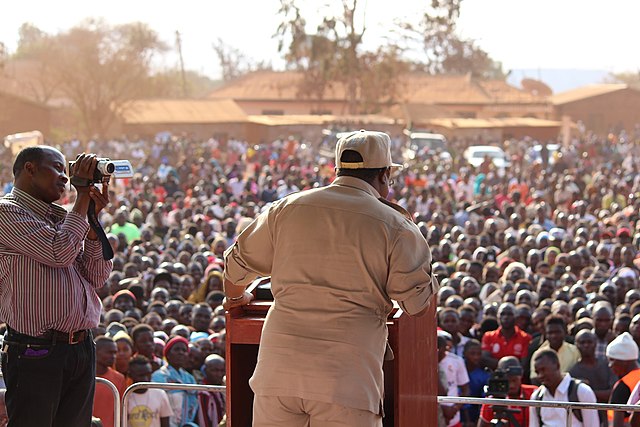
Ngorongoro is under siege. Last week, members of the European Delegation were prevented from visiting Ngorongoro. On 25th August, they also prevented a UNESCO delegation from visiting the area. Two days ago, the Tanzanian government disallowed political rallies arranged by Tundu Lissu from being held in Ngorongoro.
Yesterday, I and my family (8 in total) were blocked at the entrance Gate of the Ngorongoro. We were required to show ID to prove whether we were residents of Ngorongoro, which we did. Thereafter they said we cannot cross unless we pay an entrance fee. Fortunately, we had thought about this beforehand, given the ongoing lawlessness, and paid earlier. But when we showed the payment receipt. They told us,
“Whether you are going home, either for a party or for the funeral, you are not going to enter Ngorongoro or else, we are going to carry your corpse“
One of the cars had the registration number 550 DKW.
There were almost sixty armed security personnel; some in police uniforms, other game rangers and many in plain clothes.
While discussing with them why we can’t be allowed to go home, I received a call from the Tundu Lissu convoy, informing that they had been blocked some 12km away behind us. One person, a resident of Endulen was arrested. Thereafter another three people were arrested in Endulen yesterday.
Today early in the morning, Tundu Lissu was abducted from the hotel he stayed in last night, another 7 people were subsequently arrested in Karatu. Lissu and his colleague’s whereabouts, as I write this article, remain unknown. The police confirmed that they are holding Lissu in an unspecified location.
Around 11 a.m. Tanzania time today, two Maasai Women were arrested in Endulen by police. One is breastfeeding and the other is 66 years old. Police have refused to bail them out despite their condition and nothing has been indicated about the crime they have committed. At least, one was covered in social media just two weeks ago publicly saying “WE ARE NOT GOING TO MSOMERA”
In the past three weeks, the government has arrested 53 people in Endulen alone including the political and traditional leaders of all levels as part of exerting pressure to move everyone out. Now the cases of arrest connected with forceful Maasai displacement in favour of wealthy people for either hotel investment or luxury hunting, under pretexts of conservation, has risen to over 60 (including Lissu and Other CHADEMA officials).
Two days ago, the Legal and Human Rights Centre issued a detailed statement on the situation in Ngorongoro (you can view this video on youtube).
Tanzania’s government is undertaking a very systematic and destructive campaign against the Maasai community in Northern Tanzania. This campaign is fuelled by the blood-soaked monster of green colonialism. Ngorongoro has been turned into a police state and whoever wishes to verify facts on the ground will be met with the mighty powers of the state.
One example is that of a pregnant woman who died on 27th August. She requested a flight ambulance but the government did not give a permit to fly. She died just at the entrance gate of the hospital in Arusha more than a day later. I believe her life could have been rescued if the Medical Flying Service had not been grounded by the government. There are many cases of this nature and the government shows no sign of listening.
This is just data from one source that shows the magnitude of the problem the Maasai community is being forced to go through by the repressive Tanzanian government. This process is influenced by money overflowing across the world which to the Maasai, is a weapon to displace everyone from their ancestral land. I believe in our individual and collective efforts, we can end all repressive action against the Maasai community and all those who save for crimes of protecting their land that has become the envy of many around the world.
On behalf of those suffering under their repressive government, your action on this matter is appreciated in advance.
I will keep you updated on this sadly ongoing situation
Joseph Oleshangay, 10th September 2023
Day of Action for Sexual Self-Determination 16th September 2023
The Left Berlin
10/09/2023
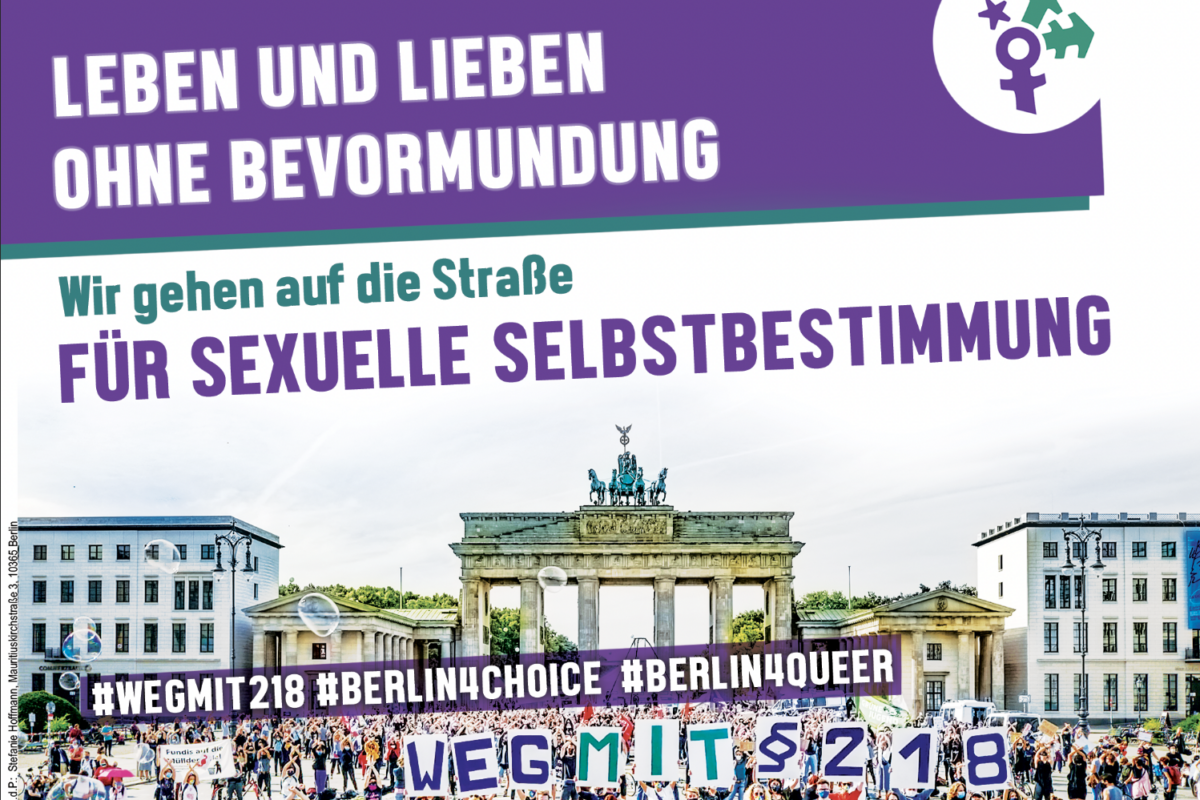
(see below for the Call to Action in Portuguese, Spanish and German)
On 16th September 2023, Christian fundamentalist and right-wing nationalist opponents of the right to sexual determination are once more staging a so-called “March for Life” in Berlin-Mitte. They are demanding a total ban of abortions and are agitating against non-heterosexual couples or families, and the diversity of sexual identities.
The Anti-Choice movement is represented in parliament by the Christian-conservative CDU/CSU and the AfD (which is developing into a Nazi party). They are part of an international network and in Germany, Europe and currently particularly in the USA, they are putting pressure on governments to pass reactionary repressive laws.
These forces want to deny us all the right to self-determination over our own bodies and lives. We cannot surrender the streets of Berlin to them! Our day of action for sexual self-determination will be taking place under the motto “Live and Love without Paternalism.”
This day is also the kickoff for a national week of action for sexual self-determination, which will end with various meetings and actions throughout the country on 28th September, the international day for the decriminalisation of abortion.
12 noon Brandenburger Tor – 13.50 Bebelplatz
12 noon, Brandenburger Tor / Pariser Platz Kick-off rally with:
Music from HEARTCHOR.Love. Part 1 begins at 11.50.
Welcome and speech about the Day of Action (Annika, Bündnis für Sexuelle Selbstbestimmung)
Speech from Martina Regulin, head of the GEW teachers’ union in Berlin-Mitte
Speech from Stephanie Schlitt (national leadership of Profamilia) on the current demands to remove abortion regulations from the criminal code
Feminist hymn by Queen Bees & the Beat – “Powerful “omen”
Isabel Sophie (from Dyke* March Ruhr / FLUID Bochum – Centre for queer culture and secular education) on the human rights backlash in the USA regarding abortions and the lives of queer people.
Demonstration from Brandenburger Tor to Bebelplatz
13.50 Bebelplatz Final rally
Demands for a self-identification law (Trans, Inter, Queer e.V.)
Kurdan (intercultural women’s group ROSA) on self-determination over your own body
Arian Darat (Iranian community) on the revolution of self-determination. The role of the queer community in Iran, their visibility, and how the woman*-Life-Feedom movement can make new alliances.
Phillipp Möller from the central council of non-believers on the influence of Christian fundamentalist organisations on politics)
Astrid Lück (policy officer for families, women and girls for the Paritätischen Wohlfahrtsverband (parity welfare organisation) on cuts in the national budget in 2024/2025 for the financing of pregnancy counselling.
Songs from the Ukrainian-Russian A Capella group perepjolotschki
Acknowledgements and good-byes by Ines from the BfSS
15.00 End.
This call for action was issued by the Bündnis für Sexuelle Selbstbestimmung. Translation: Phil Butland. Reproduced with permission.
Viver e Amar sem Paternalismo. Tomar as ruas pela autodeterminação sexual para todas as pessoas
No dia 16 de Setembro de 2023, fundamentalistas cristãos e nacionalistas de direita que se opõem ao direito à determinação sexual estão mais uma vez a organizar uma chamada “Marcha pela Vida” em Berlin-Mitte. Exigem a proibição total do aborto e fazem agitação contra casais e famílias não heterossexuais, e contra a diversidade de identidades sexuais.
O movimento Anti-Escolha é representado no parlamento pelo partido cristão-conservador CDU/CSU e pelo AfD (que se está a transformar num partido nazi). Fazem parte de uma rede internacional e na Alemanha, na Europa e atualmente, particularmente nos EUA, estão a pressionar os governos para que aprovem leis reacionárias repressivas.
Estas forças querem negar-nos a todos/as/es o direito à autodeterminação sobre os nossos próprios corpos e vidas. Nós não podemos entregar-lhes as ruas de Berlim! O nosso dia de ação pela autodeterminação sexual acontecerá sob o tema “Viver e Amar sem Paternalismo”.
Este dia é também o pontapé de saída para uma semana nacional de ação pela autodeterminação sexual, que terminará com vários encontros e ações em todo o país no dia 28 de Setembro, o dia internacional pela descriminalização do aborto.
Día de acción por la autodeterminación sexual 16.09.2023. VIDA Y AMOR SIN MORDAZA
Salimos a la calle por la autodeterminación sexual para todes.
El 16 de septiembre de 2023, fundamentalistas cristianes y nacionalistas de derechas contraries al derecho a la autodeterminación sexual volverán a organizar una denominada Marcha por la Vida en Berlín-Mitte. Exigen la prohibición total del aborto e instigan contra las parejas o familias no heterosexuales y la diversidad de identidades de género.
En los parlamentos, el movimiento antiabortista está representado por la conservadora y cristiana CDU/CSU y la AfD, que se está convirtiendo en un partido nazi. Están interconectados internacionalmente y ejercen presión sobre los gobiernos para que aprueben leyes regresivas y represivas en Alemania, Europa y actualmente sobre todo en Estados Unidos.
Estas fuerzas quieren negarnos a todes el derecho a la autodeterminación sobre nuestros cuerpos y nuestras vidas. No debemos dejarles las calles de Berlín. Nuestro día de acción por la autodeterminación sexual se celebra bajo el lema “Vivir y amar sin mordaza”. Este día es también el comienzo de una semana nacional de acción por la autodeterminación sexual, que concluirá el 28 de septiembre, Día Internacional por la Despenalización del Aborto, con diversos actos y acciones en todo el país.
Aktionstag für sexuelle Selbstbestimmung 16.09.2023 LEBEN UND LIEBEN OHNE BEVORMUNDUNG
Wir gehen auf die Straße für sexuelle Selbstbestimmung für alle
Am 16. September 2023 veranstalten christlich-fundamentalistische und rechtsnationale Gegner*innen des Rechts auf sexuelle Selbstbestimmung in Berlin-Mitte wieder einen sogenannten Marsch für das Leben. Sie fordern das totale Verbot des Schwangerschaftsabbruchs und hetzen gegen nicht heterosexuelle Paare oder Familien und die Vielfalt geschlechtlicher Identitäten.
In den Parlamenten ist die Anti-Choice-Bewegung vertreten durch die christlich-konservative CDU/CSU und die sich zur Nazipartei entwickelnde AfD. Sie sind international vernetzt und üben in Deutschland, Europa und gegenwärtig besonders stark in den USA Druck auf Regierungen aus, rückschrittliche, repressive Gesetze zu erlassen.
Diese Kräfte wollen uns allen das Recht auf Selbstbestimmung über unseren Körper und unser Leben absprechen. Wir dürfen ihnen nicht die Straßen Berlins überlassen! Unter dem Motto „Leben und lieben ohne Bevormundung“ findet unser Aktionstag für sexuelle Selbstbestimmung statt. Dieser Tag ist auch Auftakt für eine bundesweite Aktionswoche für sexuelle Selbstbestimmung, die am 28. September zum Internationalen Tag für die Entkriminalisierung des Schwangerschaftsabbruchs mit verschiedenen Veranstaltungen und Aktionen bundesweit endet.